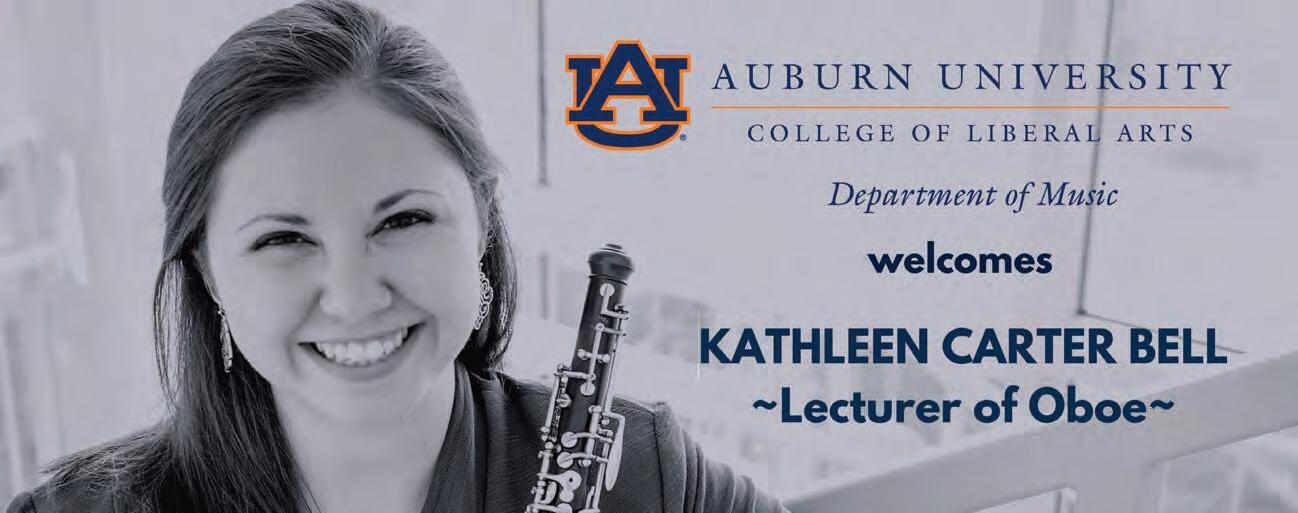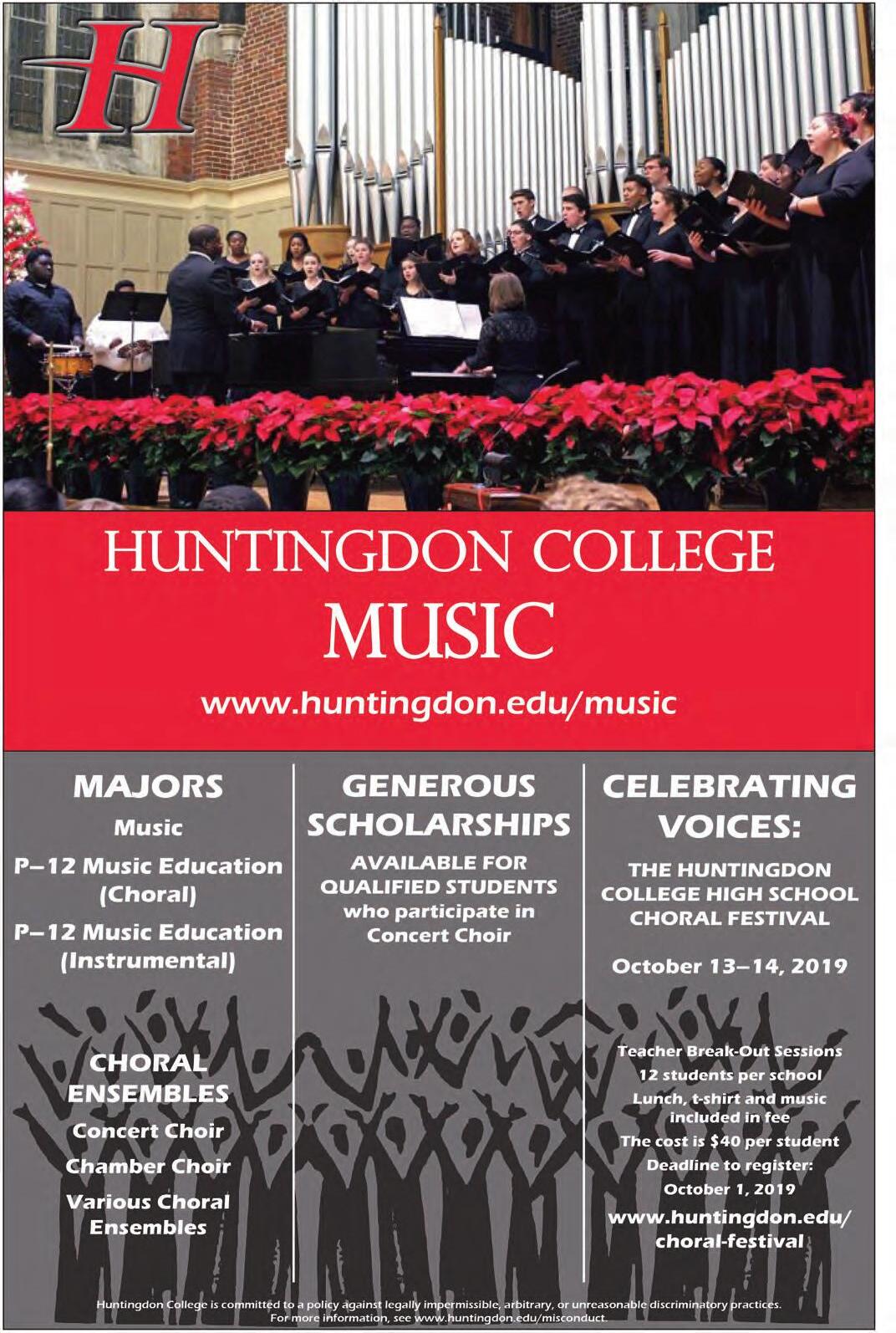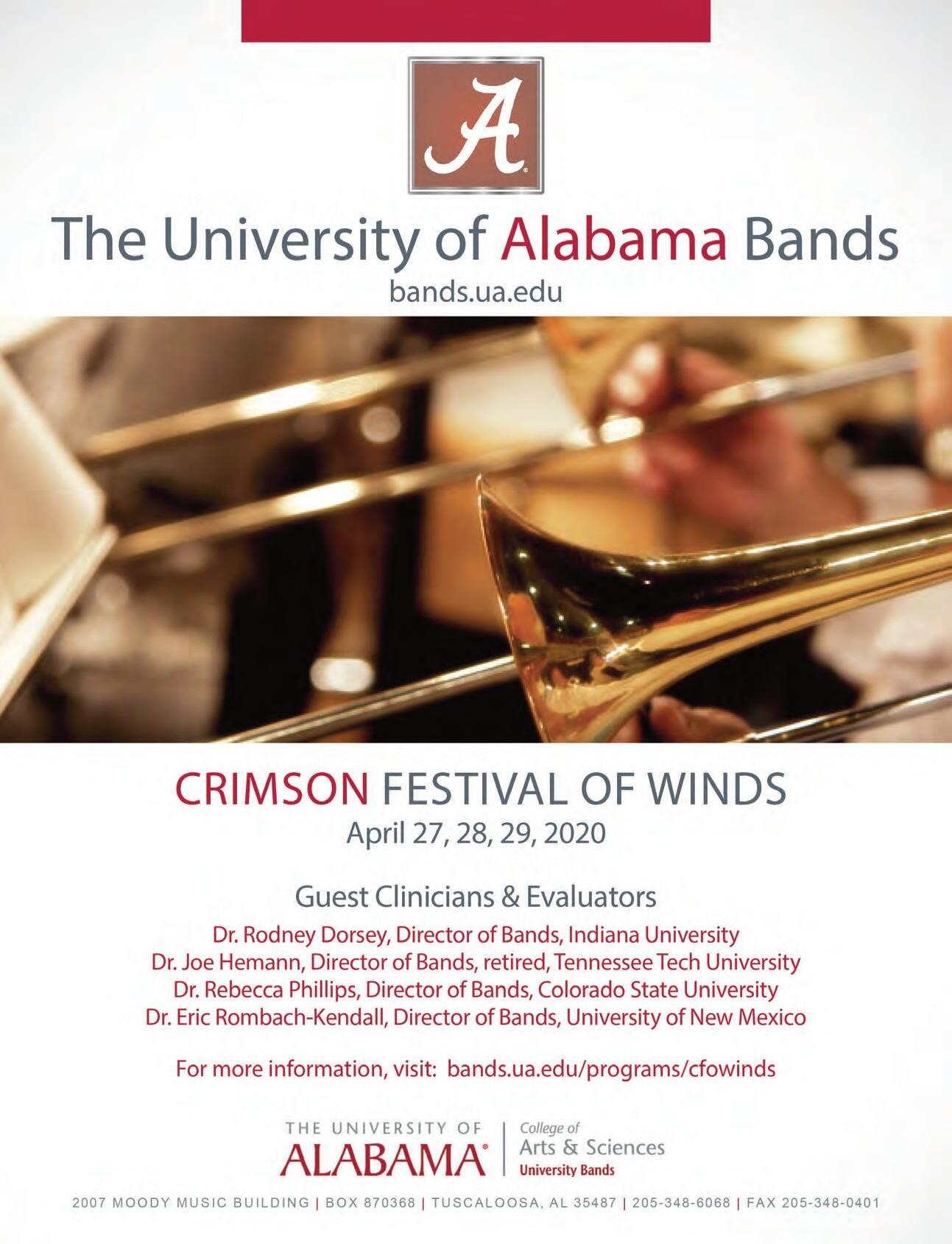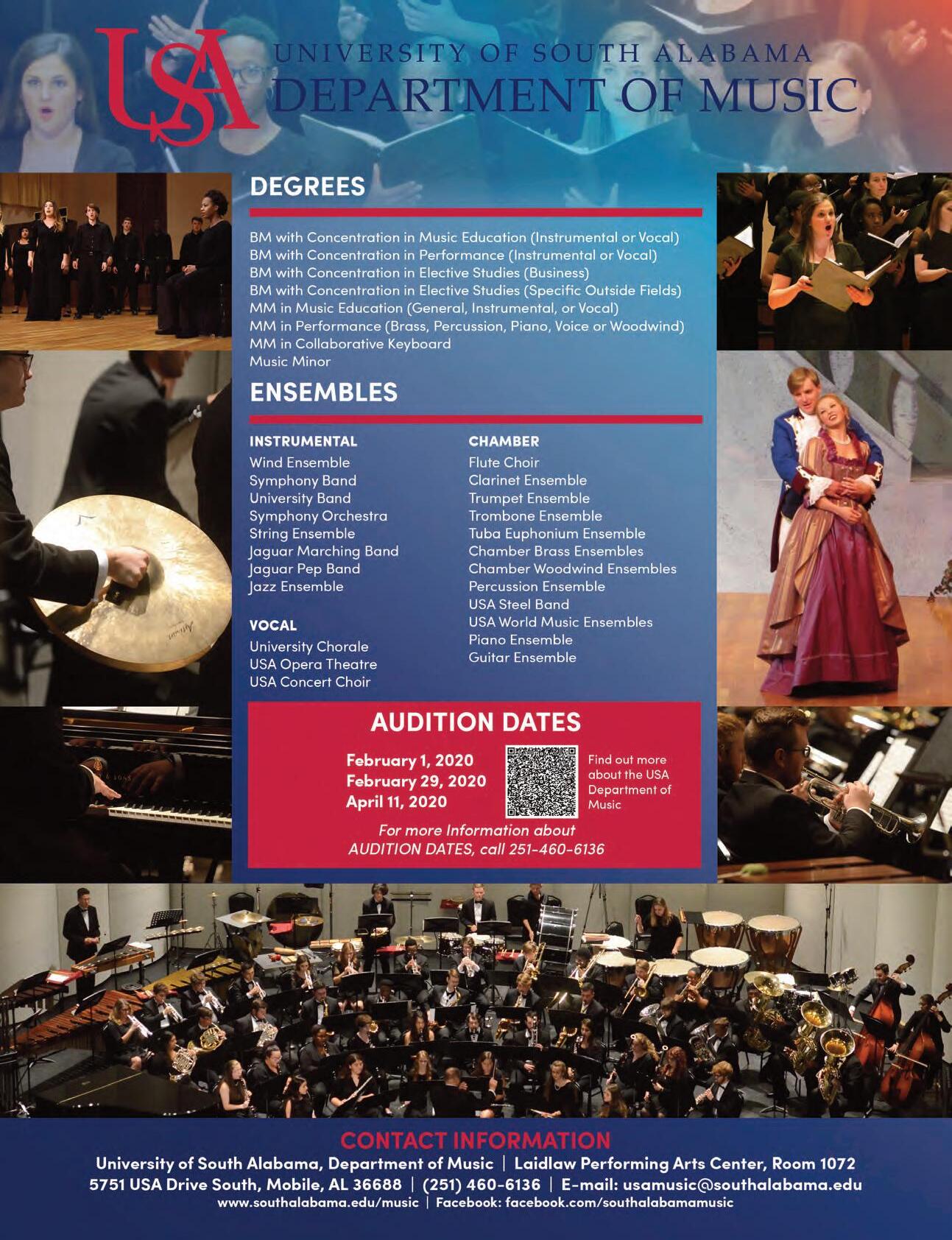ala breve
Inside:
FAME Essay
Jackson Tucker
Remembering Jerry Bobo
Frank Buck
Who Is Your Tone Hero?

Phi Beta Mu “Tips That Click”
De-Stress for Success
Ella Wilcox
Our Jazz Community
Matt Leder


Inside:
FAME Essay
Jackson Tucker
Remembering Jerry Bobo
Frank Buck
Who Is Your Tone Hero?

Phi Beta Mu “Tips That Click”
De-Stress for Success
Ella Wilcox
Our Jazz Community
Matt Leder



(800) 681-4188
Landmark Tour & Travel’s Music Festival Coordinator, Kim Kinsaul, has more than twenty years experience planning student tours. She and her team of fully trained travel professionals can customize your tour to any major choral or instrumental festival at any location that you choose.
Choice Music Festivals • Cruise Festivals • Festival Disney Festivals of Music • Field Studies Carnegie Hall Performance



Fiesta-val Music Festivals • Heritage Festivals

Manhattan Concert Productions • MidAmerica Productions


Music in the Parks • OrlandoFest • Music USA Orlando
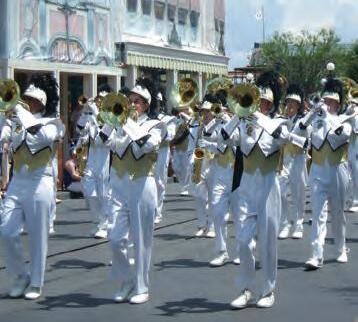
Southern Star Music Festival . . . AND MORE

Atlanta, GA • Branson, MO • Chicago, IL • Gatlinburg, TN
New Orleans, LA • New York, NY • Orlando, FL
Saint Louis, MO • San Antonio, TX • Toronto, ON Washington, DC • Williamsburg, VA . . . AND MORE Sample itineraries are available for each destination. If the festival or destination of your choice is not listed, call for a custom proposal.

Contact Kim Kinsaul at (205) 714-7888 or kim@travellandmark.com to begin planning your tour today!

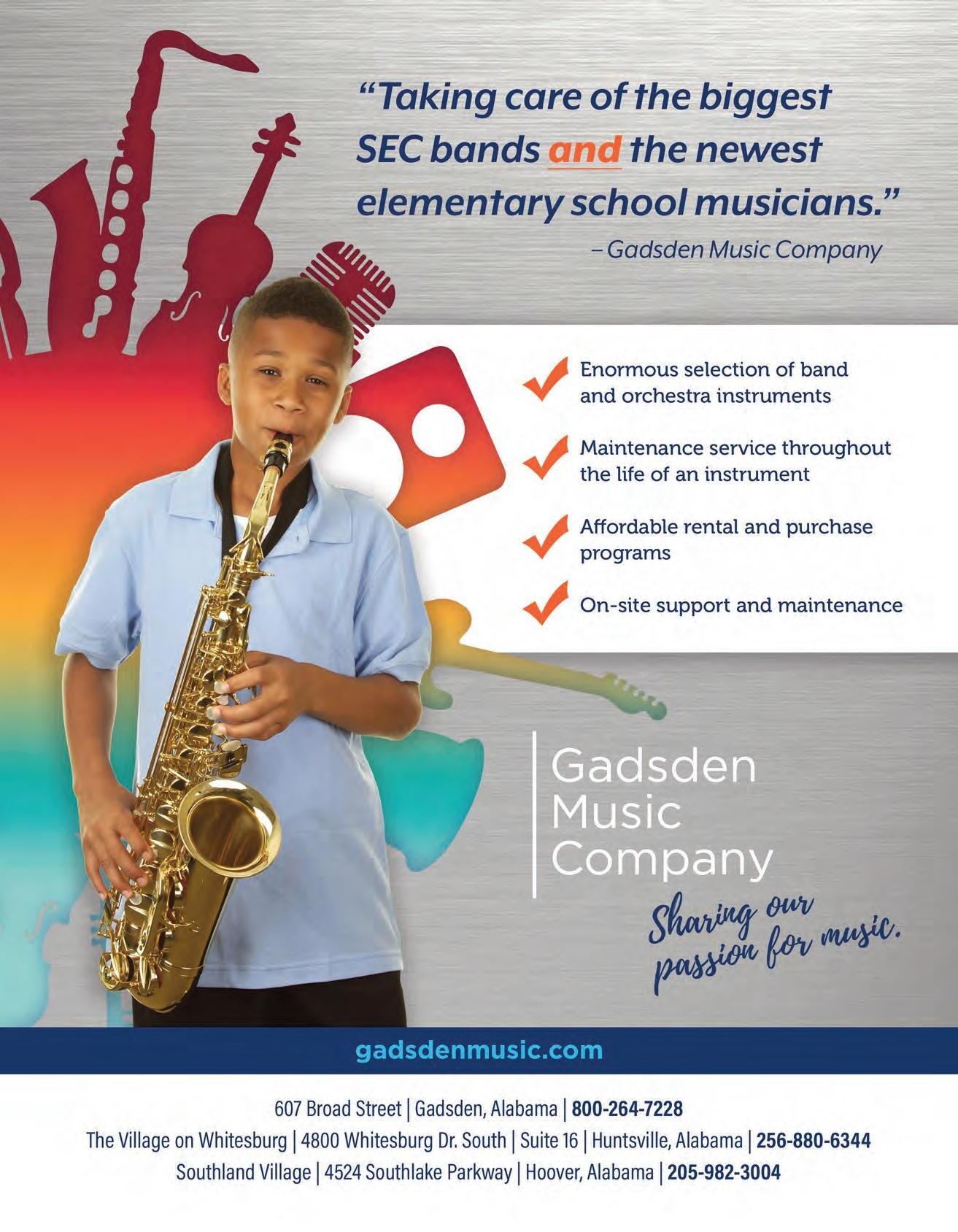
AUBURN UNIVERSITY
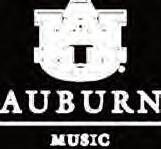
A CLINIC FOR HIGH SCHOOL CHOIRS WITH AUBURN UNIVERSITY FACULTY AS WELL AS LARGE ENSEMBLE OPPORTUNITIES FOR SELECTED STUDENTS
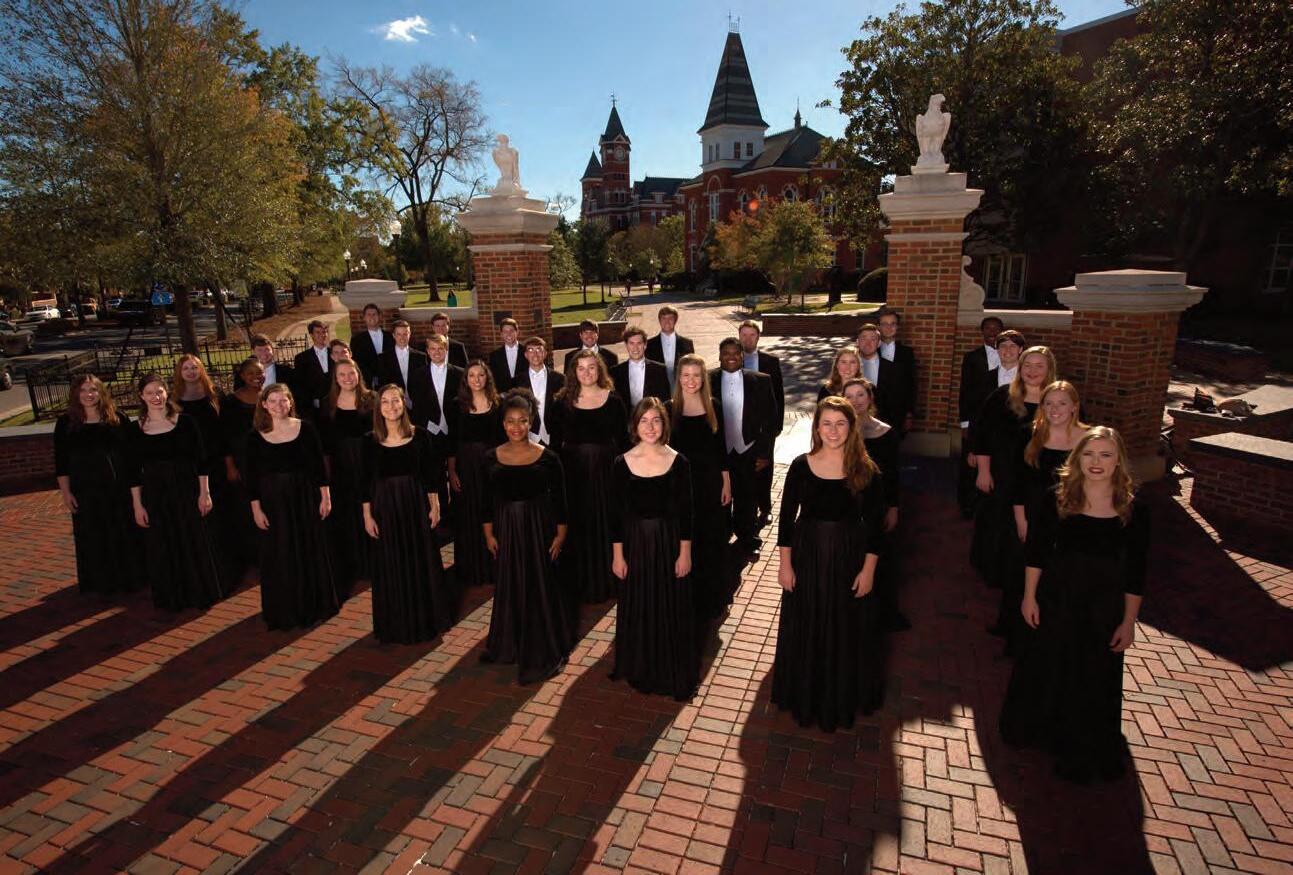
FOR MORE INFORMATION ABOUT THE FESTIVAL, EMAIL
OR VISIT
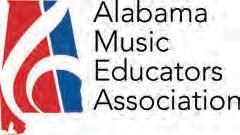

President Greg Gumina Shades Valley High School 6100 Old Leeds Road Irondale, AL 35210 (205) 956-4638



ggumina85@gmail.com
Immediate Past President
Susan Smith 104 Smith Hall Troy, AL 36082 (334) 670-3322 ssmith26024@troy.edu




President, AOA
Guy Harrison 218 Goodwin Music Building Auburn University, AL 36849 (334) 844-8192 gfh0002@auburn.edu
President, AMEA Collegiate DeLee Benton dbenton@forum.montevallo.edu
Industry Representative
Becky Lightfoot Arts Music Shop 3030 East Blvd Montgomery, AL 36116 334/271-2787
beckyl@artsmusicshop com
Executive Director
Editor, Ala Breve
Garry Taylor 1600 Manor Dr NE Cullman, AL 35055 (256) 636-2754 amea@bellsouth.net
President-Elect
David Raney Sparkman High School 2616 Jeff Road Harvest, AL 35749 256-837-0331 draney@madison.k12.al.us

Recording Secretary
Carla Gallahan
113 Long Hall Troy University Troy, AL 36082 (334) 670-3502 recording_secretary@myamea.org
President, AVA
Megan Jones Decatur High School 1011 Prospect Drive Decatur, AL 35601 (256) 552- 3011 presidentofava@gmail.com

AMEA Collegiate Advisor
Edward (Ted) Hoffman University of Montevallo Station 6670 Davis Music Building 308 Montevallo, AL 35115 (205) 665-6668 ehoffman@montevallo.edu
Assistant Executive Director
Rusty Logan 2020 Janabrooke Lane Auburn, AL 36830 (334) 663-1702 rlogan9853@gmail.com
Treasurer/Registrar
Pat Stegall
AMEA Registration PO Box 3385 Muscle Shoals, AL 35661 treasurer_registrar@myamea.org
President, ABA
Terry Ownby
Florence High School 1201 Bradshaw Drive Florence, AL 35630 (256) 768-2200
tsownby@florencek12.org
President, ELEM/GEN
Betty Wilson Deer Valley Elementary 4990 Ross Bridge Parkway Hoover, AL 35226 (205) 296-3311 bettyboop122372@att.net
President, Higher Education Mildred Lanier Jefferson State Community College (205) 983-5309 mlanier@jeffersonstate.edu

Alabama Department of Education Arts Education Specialist
Andy Meadows 50 North Ripley Street Montgomery, Alabama 36104 (334) 353-1191 ameadows@ALSDE.edu

Garry Taylor, Editor & Advertising Manager 1600 Manor Dr NE Cullman, AL 35055 (256) 636-2754 executive_director@bellsouth net




ADVERTISING & COPY DEADLINES
Fall - August/September (Back to School) issue: July 15
Winter - October/November (Conference) issue: September 15
Spring - May/June (All-State) issue: January 15
Summer - May/June (Digital Only)
Unless otherwise indicated, permission is granted to NAfME members to reprint articles for educational purposes. Opinions expressed in this publication are not necessarily those of AMEA or the Editor. All announcements & submissions are subject to editorial judgement/revision.The Alabama Music Educators Association is a state unit of NAfME: The National Association for Music Education, a voluntary, nonprofit organization representing all phases of music education in schools, colleges, universities, and teacher-education institutions. Active NAfME/AMEA membership is open to all persons engaged in music teaching or other music education work.
(August, October, February & May) by the Alabama Music Educators Association
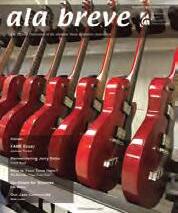

AMEA would like to express appreciation to the following partners who have joined AMEA in our efforts to promote music education in Alabama. Please support these industry/institutional members who support you as music educators!
Arts Music Shop, 3030 East Blvd., Montgomery, AL 36116
Halftime USA Band Front Camps, P.O. Box 66, Wetumpka, AL 36092
JW Pepper, 9053 Riverside Pkwy, Lithia Springs, GA 30122
Southeastern Performance Apparel, 142 S. Woodburn Drive, Dothan, AL 36305
Southern Performances, P.O. Box 6852, Gulf Shores, AL 36547
University of Alabama in Huntsville, 301 Sparkman Drive, Huntsville, AL 35899
University of South Alabama, LPAC 1072, 5751 USA Drive South, Mobile, AL 36688
University of Alabama at Birmingham, 950 13th Street S., Birmingham, AL 35294
1946 Yale H . Ellis
1948 Walter A . Mason
1950 Vernon Skoog
1952 John J. Hoover
1954 Lamar Triplett
1956 Carleton K . Butler
1958 Mort Glosser
1960 Wilbur Hinton
1962 Lacey Powell , Jr .
1964 G. Truman Welch
1966 Jerry Countryman
1968 Floyd C . McClure
1970 Jerry Bobo
1972 Frances P. Moss
1974 George Hammett
1975 Frances P. Moss
1976 S . J. Allen
1978 W. Frank McArthur
1980 Paul Hall
1982 Lacey Powell , Jr .
1984 Johnny Jacobs
1986 Merilyn Jones
1988 Ronald D. Hooten
1990 Ken Williams
1992 Dianne Johnson
1994 James K . Simpson
1996 Johnnie Vinson
1998 Michael Meeks
2000 John McAphee , Jr .
2002 Tony Pike
2004 Becky Rodgers
2006 John Baker
2008 Pat Stegall
2010 Steve McLendon
2012 Sara Womack
2014 Carl Hancock
2016 Susan Smith
2018 Greg Gumina

My sincere hope is that you all had a great summer and that you are prepared to return to the business of educating our young people. It has been very rewarding to follow all of the professional development activities so many of you sought out during these summer months. We have an awesome profession, and I am constantly humbled by, and appreciative of professionals sharing knowledge with each other. It's definitely one of the things which make our profession so special. Once again, I would like to thank you for allowing me the opportunity to represent and work for you as your President. I will continue to do my best in that capacity, and it has indeed been my pleasure to serve our organization.
The Governing Board had a very productive meeting in June with a very full agenda. All the represented divisions gave excellent reports concerning the depth and breadth of their respective activities and programs. There are truly some exciting things happening throughout our state. All the divisions are healthy and vibrant, and rest assured that each division is very well represented. You have done an excellent job of electing great representatives in each of our divisions. I am happy to report that our organization is moving forward toward our 75th Anniversary next year in a very strong financial position, and membership numbers are solid. Please talk to your fellow music
education colleagues and encourage them to renew their membership in AMEA, or join us if they are not already a member.
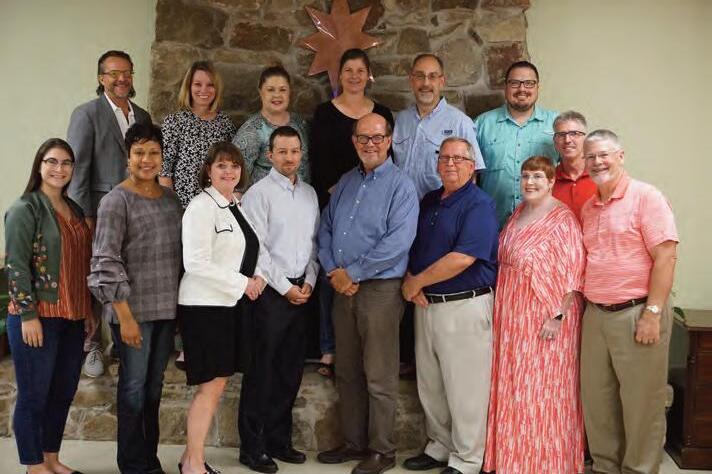

The NAfME National Leadership Conference, Collegiate Advocacy Summit, and 2019 Hill Day were June 17th-21st. The AMEA was very well represented by two great teams of music education advocates from our state leadership. While in Washington, DC we were able to meet with representatives from the offices of Senator Doug Jones, Senator Richard Shelby, Congresswoman Terri Sewell, Congresswoman Martha Roby, Congressman Mo Brooks, Congressman Gary Palmer, Congressman Mike Rogers, and Congressman Bradley Byrne for Hill Day. We were even fortunate enough to meet with Congresswoman Martha Roby and Congressman Gary Palmer in person. Thanks to these two Representatives for taking the time to meet with us personally. Our message was well received in all offices as we shared the importance of music education as part of a well-rounded education. We made several requests as part of the goals for the day, both legislative and fiscal. The House and Senate have done a very good job of funding the “Every Student Succeeds Act” through the appropriations process, and all parts of the law are currently being funded for 2020 at significantly higher levels than during the Fiscal Year 2019. We also asked for Legislative support for the “GAAME” Act (Guaranteed Access to Arts and Music Education) while on the Hill this year, which more specifically enumerates how federal funding should be used in support of music education. For specifics on federal appropriations, authorized spending, and all things “ESSA” and “GAAME,” please see the NAfME website. During our meetings, we presented each Senator and Congressperson with a framed copy of our state song and a note from the AMEA as part of our State’s Bicentennial Celebration. During the National Assembly many valuable sessions were presented and information was shared amongst state leaders concerning subjects such as: Country Music Association Grants, ESSA Title IV (Part A), Strategies for Cultivating New and Emerging Leaders, Governance and Fiduciary Responsibilities, Mentoring: State and National, Connecting with the Fundraising Community, Vision 2020: The Future is Now for NAfME, Shortening the Distance: State, Division, and National Collaboration, Working with Affiliate Organizations, and National Standards Initiatives, amongst other informative and valuable sessions. We were also able to meet with Matt Barusch, NAfME State Advocacy and Engagement Manager, to discuss ideas concerning our own advocacy efforts here in Alabama. Dr. Rob Lyda has been doing a great job heading up these efforts for us and we will all need to be engaged in the process of advocacy.
has been doing a great job heading up these efforts for us and we will all need to be engaged in the process of Advocacy.
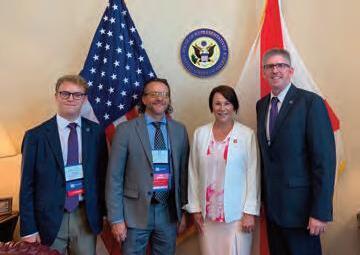
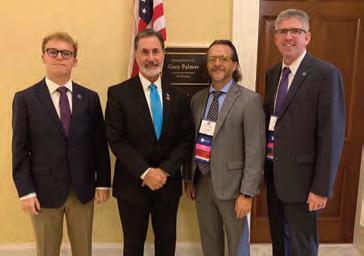
As you know, we are returning to Montgomery for our 2020 conference this year. Please make plans to attend the conference now, and please plan to stay on site. Congratulations to all the performing groups and presenters who were chosen for our conference this year. We look forward to enjoying your performances and learning from your willingness to share knowledge. The Keynote Address and General Session will be on Thursday morning, January 16th at 10:30. Please arrange your travel plans so you are able to attend. The Governing Board will be meeting in August to finalize plans for the conference, and I’m looking forward to seeing all of you there. It’s going to be fabulous!
The agenda during my tenure has been driven by the goals of advocacy, action, technology, collegiality, standards, knowledge, and pride. I
would like everybody to feel included, important, and crucial to the success of the AMEA. There is no stronger advocacy group than one which is united. We all play a part in the musical education and social development of our young people in Alabama, and I wish for us all to identify as one unified association. One of the main ways we are accomplishing this is through advocacy efforts. I want us to become more visual in our communities, in our State Capitol, and be more culturally relevant to our populous. Let’s all continue to be both visible and vigilant at the local, state, and national levels. All politics is indeed local, so make sure you are in contact with our elected officials on all levels. Invite them to your concerts and other events to let them see that music education is healthy and vibrant in Alabama. Additional to all of this, we will be helping our state celebrate its bicentennial. There are now downloadable PDF arrangements of our state song on the AMEA website which I hope you will program on your various concerts and events this fall. We will continue our performances in the State Capitol Rotunda during the spring legislative session. And finally, I can now officially announce that we will be a very vital component of the Bicentennial Celebration and parade on December 14th of this year. Funding has been acquired from the ALSDE, Bicentennial Commission, and the Travel and Tourism Commission, so look for announcements and information about this event which will be released very soon.
As we move forward into the 2019-20 school year, let’s all commit to finding that first-year teacher, that new person to our state, and our fellow music educators not currently involved in AMEA and invite them to participate. I hope that you all have a great school year with wonderful lessons based on best practices, standards and assessments, and high-quality sequential methodologies. Our students deserve the best that we can do for them. Now let’s get busy educating the young people throughout our beloved state.
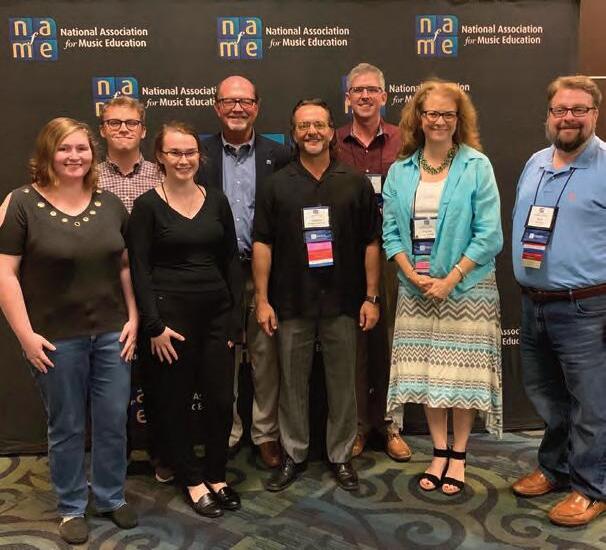
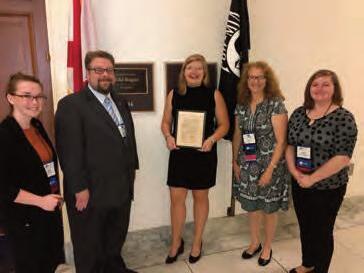
Respectfully Submitted, Gregory
L. Gumina

One of the most prominent threats to music education is the supposed lack of support from the federal government and our own education systems. In several schools, especially those underfunded or understaffed, the arts—visual art, theater, music, and more—are the first to be reduced or cut. So, how can current and future music educators do more to understand the legislative jargon that allocates the funds for music and the arts? How can we use this knowledge to better advance our programs and support our students?
The National Advocacy Summit in Washington D.C., an annual event sponsored by NAfME, is a great force for change in this area. This unique event allows collegiate members of NAfME from all over the country to congregate in Washington D.C. and interact with legislators and their staffs involved in education and funding legislation. The collegiate members attended several valuable seminars, such as the State Level Advocacy Panel, Leader Development and Public Speaking, and more. They also attended Hill Day, which involved several meetings with legislators and their staffs to learn about the behind-thescenes decision-making involved in allocating funds to the education department.
The state of Alabama sent three representatives—Sarah Chambless, from the University of Alabama, and Chase Hampton and Sara Slusher, from the University of North Alabama. Chambless shared some of her personal experiences with the legislators and their staff, commenting, “I gained knowledge about legislation that could one day impact my career. I also learned how to advocate for music and the importance of doing so.”
Hampton comments that, had he not attended the Summit, he may have blamed insufficient funding or lacking support “on the apathy of a faceless group of people.” Instead, he realizes that “there are many groups of people making demands on our legislators, and some had not thought much about music education before we came. It will be a task for the upcoming generation of music educators to…create an ongoing dialogue with members of Congress. For me, it became less about what ‘they’ should be doing and more about what I can do.
Hampton’s realization is a viewpoint that we as collegiate members have a special obligation to explore. It is very easy to blame the government for hardships within the education system, especially as a future music educator—there never seems to be enough money for your dream program, and there never seems to be enough support from the legislators who make those decisions. Instead, we must explore our options—what can we do with the funding we have? How can we recruit members of the community to support our cause? How can we serve our students and our communities to the best of our abilities? How can we create a dialogue with our congressmen and women—or, perhaps more importantly, our own school officials?
All of the above questions have a very simple solution: we must all be well-versed in the tricky rhetoric of effective advocacy. There are endless online resources, countless seminars—college students have so many resources that become more difficult to access once we
graduate, so we must be proactive. Within your own chapter, discuss the necessity of advocacy, and raise funds to bring in a speaker or send representatives to a seminar. Better yet, explore the possibility of having one or more members apply to next years’ Summit, or fundraise to send one of your members independently.
The next challenge we often face is this: once we know how to advocate, what can we use? There is extensive and conclusive evidence to support the necessity of music and the arts in children’s overall development; NAfME has a wonderful list outlining several advantages of music to a child’s development (see https://nafme.org/20important-benefits-of-music-in-our-schools/). These and other resources are essential to any advocate—craft your pitch, research conclusive and documented studies to prove your argument, and advocate for your school’s program to the best of your ability.

This Summit and the Summits from the past have all done an excellent job in exposing collegiate members to the inner workings of the legislation surrounding music education’s funding, as well as equipping members with the tools and courage to advocate for their programs and pass on their knowledge to their chapters and peers. There is, however, another wonderful opportunity, perhaps even more valuable than the others.
Both Chambless and Hampton agreed that, aside from the knowledge gained in advocacy and legislation, the most rewarding experience of the Summit was getting to connect with their peers from across the country. This one-of-a-kind experience allowed members from all over the nation to meet one other and swap information and ideas, all in an effort to better their own cNAfME chapters and educate their peers with the information gained. Collegiate members exchanged future plans and ideas for several key issues in statewide cNAfME chapters, including fundraising, member involvement, and participation in local schools.
Collegiate members are a powerful part of NAfME’s presence around the country—while we are still young, we have the unique opportunity to witness change within our own schools, which in turn allows us to implement those changes in our own chapters and carry the knowledge into our future jobs. We have the resources and ability to contribute to our own chapters in outreach and service, bettering our communities— we then use that knowledge and experience to nurture our programs and further our careers, all the while continuing to use our greatest resource: each other.
“While it may seem as though legislators hold most of the power,” Hampton admits, “I do not think any amount of lobbying will affect our field as much as the teachers entering.”
For more information about the National Advocacy Summit and the legislative processes involved in program funding, visit https://nafme.org/advocacy/nafme-collegiate-advocacy-summit/ and https://nafme.org/advocacy/ESSA/
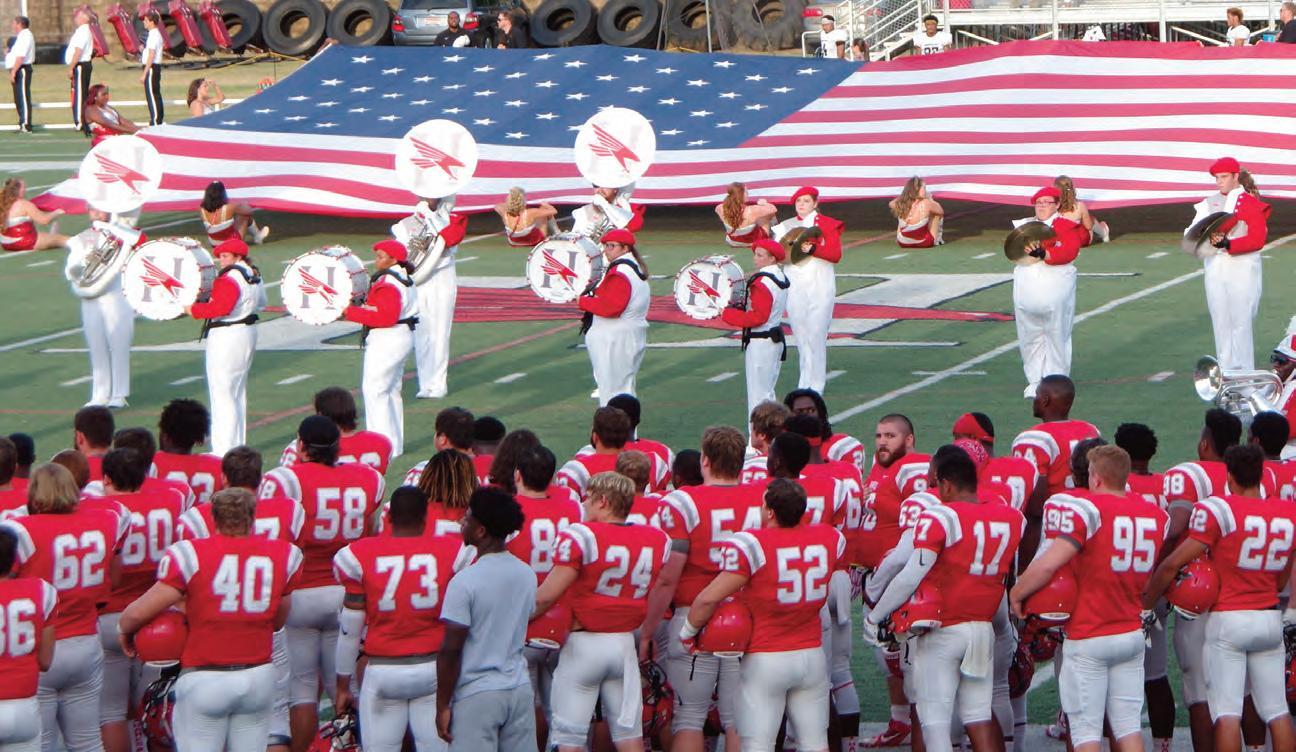

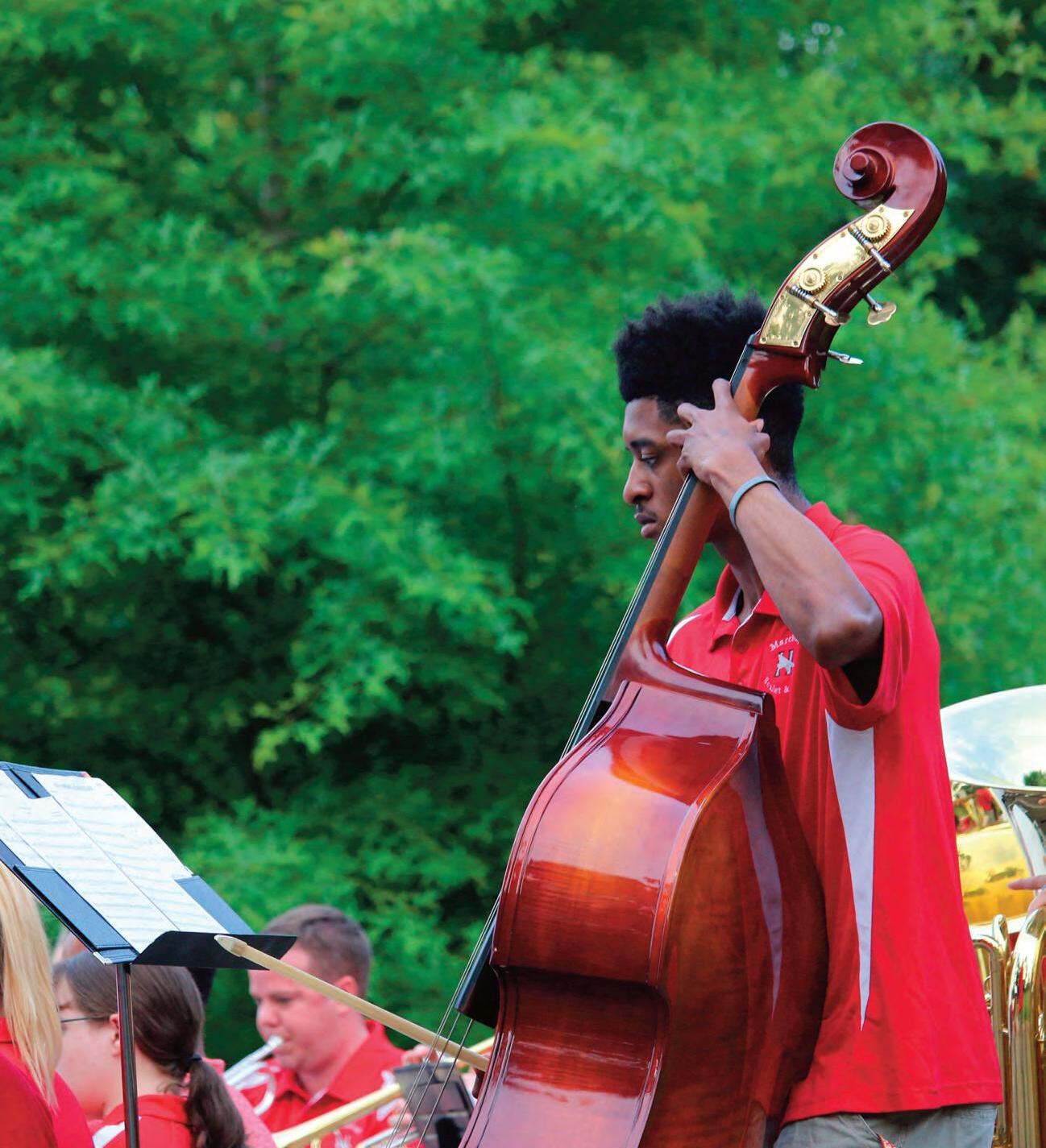

For High School and Middle School Choral Groups, Symphonic Band, Orchestras, Concert Band, Jazz Band, Marching Band, and Color Guard.
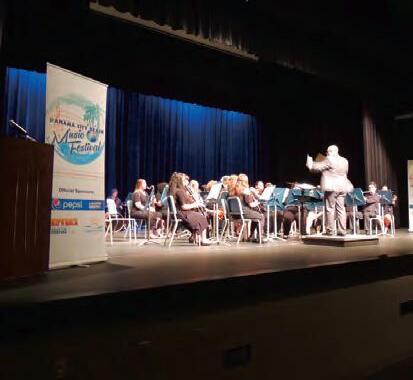
April 24-25 & May 8-9 2020

Groups are returning year after year to the most fun festival in Florida.


www.panamacitybeachmusicfestival
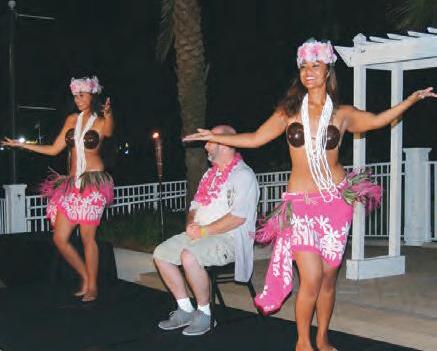

 by Jackson Tucker
by Jackson Tucker
Over the course of my eighteen years of living, one concept that remains constant is my love and passion for music education Music has played such an important role in my life and I could not have become the musician that I am today without the help and guidance of all of the great music educators that have taught me. Being involved in a music education program has provided me with experiences and wisdom that I will use for the rest of my life. Music has always been my refuge and strength when I have faced hardships Being able to express myself through music has shown me that my passion is educating others on the power and expression that can be achieved through the creation of music.
Being involved in the band program at my high school over the last several years has shown me that my passion in life is music education Music has saved me during the hardest times of my life, helping me to express my feelings in a healthy way Within this past year of my life, I have had to mourn the loss of my dear Aunt Elisa. We had been very close my entire life and bonded over singing and playing Christian music together. When she passed away very suddenly, I felt especially confused and heartbroken. A very special person in my life was suddenly gone and I felt so disconnected from reality. In the aftermath of her untimely death, I struggled to express my feelings, and I did not know how to verbalize what I was feeling and thinking. Then, I turned to music to express myself. Listening to, playing, and singing her favorite songs was what inspired me to feel once again connected to my family, my aunt, and myself. I led everyone in singing one of her favorite hymns at her funeral and this, to me, felt as though I had finally gotten to say goodbye to her
Also, as it relates to my personal experiences, I would like to touch on the lasting friendships I have made by being a part of a wonderful program. Beginning in the ninth grade, I had only a handful of people I could actually call my “friends ” These several individuals were also involved in the band program and are still some of my trusted and valued friends today The high school experience itself is daunting, but going at it alone is even more challenging. I knew this fact and began to confide in different people and started to build new friendships. As the years went on, I became more and more comfortable with change and began to increase my social boundaries During my junior year, things started to change drastically, as I now bad the leadership role of Woodwind Captain This position all o wed me to expand once again and diversified my friend group, including people I never thought I would be friends with And this past year, I was selected as a Drum Major for the marching band, placing me in charge of 150+ people, some that I have never even met before The point I am trying to make here is that being involved in a music program, or any team-based activity, can be very beneficial to the social development of teens and adolescents. The camaraderie associated
with band is key to having a successful program and also for the production and successful students, and that is why I believe all children should have access to music education. Working together is a crucial aspect of the real world and starting in high school will be beneficial in the long run.
Furthermore, I would like to stress the importance of music not only in my experiences but how music is a key factor in the social and emotional development of children and adolescents According to a study conducted by the University of Southern California’ s Brain and Creativity Institute, individuals who had at least minimal music education at an early age had higher test scores, increased language, and reading capacities, and accelerated cognitive development(Bright Horizons, 2016). Music and the arts are some of the only educational tasks that can be considered “ whole brain” activities. The creative right side of the brain is focused on musical interpretations such as pitch, intonation, and tempo, while the analytical left side is focused on the written music and motor skills required to make a sound on the instrument. Music couples the two sides together, and in doing so, the aforementioned benefits of music education can be seen after this increased brain functionality. During my time as a devout music student, I have seen these results in both my school and myself. My music education experiences have broadened my social skills and have expanded my academic capabilities, and these are the prime reasons why I want to pursue a career in music education.
However, school board officials across the nation have ignored the statistics behind music studies and are opting to cut funding for arts programs As a music student, I believe that this is ideal is invalid and plan to fight for the arts, as I have seen the enormous impact the arts can have on individuals and even entire communities I have personally witnessed the power of music and have seen people shine through their darkest times I want to take the power of music and spread it to as many people as possible
In the coming years, I hope to see change in the world regarding music education, and I have chosen this career path to help bring along that change. As once stated by Aristotle, “Music has the power of producing a certain effect on the moral character of the soul, and if it has the power to do this, it is clear that the young must be directed to music and must be educated in it.” (Politics) I cannot wait to see our future generations thrive in the years to come and I am so glad that I chose to pursue education, as educators are the molders of our future.

 Written by Sharon Burch.
Illustrated by Tiffany Harris
A review by Deanna Bell, Music Teacher at Vestavia Hills Elementary East.
Written by Sharon Burch.
Illustrated by Tiffany Harris
A review by Deanna Bell, Music Teacher at Vestavia Hills Elementary East.

I have been using this book series in my classroom for years. The stories are full of adventure, laughter, and musical knowledge.
In book one, “Freddy the Frog and the Thump in the Night,” Freddy meets his best friend Eli and they have a summer full of adventures. The story includes an introduction to the Treble Clef and line and space notes. In this series, Sharon Burch uses character association to help with learning the names of the notes on the staff.
In book two, “Freddy the Frog and the Bass Clef Monster,” students learn about the low notes in the Bass Clef. This is a great time to talk about high/low up/down and the bass clef. This is my favorite story to read the last week of October because one of the characters is a monster!
In book three” Freddy the Frog and the Mysterious Wahooooo,” Freddy and Eli visit Tempo Island and learn about quarter notes, sixteenth notes, eighth notes, and quarter rests. Students also learn tempo terms such as presto, allegro, andante, and largo.
In book four “Freddy the Frog and the Secret of the Crater Island,” students learn about note names that are above and below the staff. There is also a great science connection where students learn about blowholes on the seashore and the location of the most famous
by Deanna Bellblowholes in the world. This is a great chance to get out the globe for a quick geography connection.
The Freddy the Frog series also includes an interactive, free webpage where students can play games as an extension of each story. They can also print free coloring book pages with characters of each book, and listen the author read selections from the books. If you are looking for an iPad or Chromebook activity for your students, this one is a great one. Each book is about 15 minutes and it takes about 10 minutes to complete each online game on a device.
My favorite part of the series is the sweet friendship between Freddy and Eli. This is a great example for teaching, kindness, patience, and courage.
Best wishes on a successful school year!
Deanna BellJanuary 16-18 Montgomery Renaissance Hotel and Convention Center

Book a room at the Renaissance:
https://www.marriott.com/event-reservations/reservation-link.mi?id=1553886248538&key=GRP&app=resvlink
Book a room at the Embassy Suites: https://embassysuites.hilton.com/en/es/groups/personalized/M/MGMESES-MEA-20200114/index.jhtml?WT.mc_id=POG
Apply to Present a Lightening Round Session (Deadline October 1): https://form.jotform.com/71234052484956
Submit a Lobby Performance Application (Deadline November 1): https://www.myamea.org/lobby-group-application/
Change is hard. Change is scary. Change is inevitable. We are reminded of this often. Many of us are facing changes this school year. Maybe we have a new job. Maybe we are teaching new grade levels. Or, maybe our principal sees so much potential in us that he/she has given us extra duties in our building. We all will experience changes with new classes as we prepare for the coming school year. In the book Who Moved My Cheese, Spencer Johnson details the woes of change on the job and how to deal with it. Here’s how the book characters Sniff, Scurry, Hem and Haw, faced the changes in their lives.
Imagine the setting: a maze where the four characters search every day for their supply of cheese. They find great cheese and become comfortable eating it day in and day out. The problem is interjected when the reliable cheese supply is suddenly moved or extinguished. The mice in the story, Sniff and Scurry hurry out into the maze to find new cheese, while the “littlepeople” Hem and Haw look around wondering what happened to their cheese. “While Hem and Haw were still trying to decide what to do, Sniff and Scurry were already well on their way.” (Johnson, p. 39). Finally, Haw realizes that if he does not change, he will become extinct. So he decides to venture out into the maze once again. One of the important questions that Haw asks himself as he tries to venture out again is “What would you do if you weren’t afraid” (Johnson, p. 48). What would WE do this year, if we were not afraid? Would we redesign a stagnant curriculum, finally participate in a choral festival, or take a new leadership position in our school? Johnson says that, “When you move beyond your fear, you feel free” (p. 56) and that “change can lead to something better” (p. 59).
The Elementary Executive Board met recently to discuss the upcoming AMEA in-service, music festival, and fall workshop. Your elementary board has been faced with some difficult decisions this year. Many perspectives of music educators all over the state were weighed, and several options were considered. Rest assured the goal of your elementary board is to continue moving our organization forward toward the future. I believe, as Johnson says, “the biggest inhibitor to change lies within yourself, and that nothing gets better until you change” (p. 71) and I believe, the handwriting is on the wall: “Change Happens: They keep moving the cheese;”
We should, “Anticipate Change: Get ready for the cheese to move;”
We must, “Monitor the Change: Smell the cheese often so you know when the cheese is getting old;”
and, “Adapt to Change Quickly: The quicker you let go of old cheese, the sooner you can enjoy the new cheese,
Change: Move with the cheese;”
Furthermore, we should, “Enjoy
Change! Savor the adventure and enjoy the taste of new cheese!”
And, “Be Ready to Change Quickly and Enjoy it Again and Again: They keep moving the Cheese.” (Johnson, p.74)
Right now, we are moving with the cheese so we can continue to enjoy it again and again.
Years ago, when I was a consultant with Mary Kay cosmetics, I made a dream board. It was a way for new consultants to envision what they wanted out of their Mary Kay business. Although I gave up selling Mary Kay long ago, I never gave up the concept of dreaming big and envisioning what I wanted to achieve. I recently went back to school and completed my goal of obtaining my Masters’ degree. Consider this, another big question from the story is “What do we need to let go of and what do we need to move on to? (Johnson p. 83). What are your big dreams for this year, for your professional development, or for yourself personally? I challenge you to set goals and make a “dream board” with your goals written out and go for it. Let go of your old habits and reach for the “new cheese.”
Thank you for your hard work, dedication and continued support of the Elementary Division of the AMEA and the children of Alabama.
See you in September, Betty R. Wilson, President Elementary/General Division

Workshops and Other Professional Development Opportunities:
East Alabama Music Workshop: August 24, 2019
Grace United Methodist Church, Auburn Tiffany English Contact: lydarob@me.com
AMEA Choir Festival: Friday, October 18, 2019 Eastmont Baptist Church, Montgomery

Contact Melissa McIntyre, Festival Director Ameafestival@gmail.com
Fall AMEA Workshop: Saturday, October 19, 2019 Clinicians: Dr. Madeline Bridges and Dr. Becky Halliday
Location: Eastmont Baptist Church, Montgomery
Contact: elementaryamea@gmail.com
AMEA In-Service Conference: Jan 16-18, 2020
Renaissance Montgomery Hotel and Spa
Featured Clinician: Jim Solomon
Details will be available soon at www.myamea.org
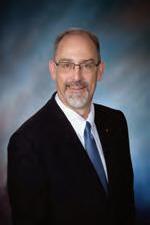
As we start this new school year, the ABA board is at the beginning stages of a 4-year evaluation cycle/review where we will be looking at the data from the past four years of MPA/All-State tryouts and see what the data reveals to us about what we are doing around the state. The committee will use the data to bring back recommendations to the board. As we continue to evaluate what we do, please help us by participating in surveys, evaluations at events and using the app for the AMEA conference in order to rate the conference and clinics you attend. Your input is very valuable. Please remember the Alabama Bandmasters is an organization that serves its members, and we can only do this with your input.
ABA Summer Conference 2019 was great and very well attended. Thank you to our clinicians Doug Farris, Jeff Fondren, Mike Guzman, Missy Lindley, David Caddell, Josh Lynch, Nathan Haskew and our Old Fogey series by Harry McAfee. This conference was filled with something for everyone. I know everyone who was able to attend came away motivated and recharged for the new year ahead. We would also like to thank the following sponsors for providing a wonderful shrimp boil that allowed our band family to come together and fellowship:
Southern Performances - David and Dayna Brannan
Group Travel Network - Justin Shuler

Demoulin - Jeff Thurber and Frank Godfrey
AWB Apparel - Wayne Broom
Sound Choice Recordings - Chester Bean
Art’s Music Shop - Paul Freehling
Simply Bedding - Charlie Colwell
We ended the event by presenting our outgoing Executive Secretary, Harry McAfee, a wooden, hand-made music stand in appreciation for his 9 years of service to ABA.
During the conference, the ABA Executive committee presented two names to the board for consideration for the Executive Secretary position. The board voted in Doug Farris as the new ABA Executive Secretary effective July 1, 2019. With this move, Doug relinquished his position on the board as Past President. The ABA Board of Directors reached out to Mr. John Cooper, a past ABA president, to fill this 2-year term on the ABA board. He agreed and we appointed him to this position during our conference. Also, there are several pieces of legislation that came before the board
which the membership will have the opportunity to vote on at AMEA. We will publish these for you to have access to on the Myamea site, the ABAfest site and on the following pages in this issue of Ala Breve. This will give you time to read and familiarize yourself with them before we discuss and vote at AMEA in January. The board also approved a new MPA Adjudication Sheet that we will be used beginning this year. Your district chairman will have more information at your Fall meeting in regard to this change.
Joel Henson met with the Music Selection Committee and they were able to look at the High School All-State Etudes. We will be moving back to method books for these this Fall. The list of books has been sent out. Please make sure that your student has the book with them when they register at the All-State tryout. The board also approved a new high school scale sheet format for this year.
As the new year begins, I encourage you to become involved. The AMEA and ABA provide great clinics, resources, and concerts that are meant to aid you in being the most effective educator you can be for your students. These events allow opportunities to collaborate, network, encourage and most importantly, learn from each other. Why do we have to reinvent the wheel when our neighbor band director already has the plan? Renew your NAfME membership TODAY and register for the AMEA Conference at the Renaissance Hotel in Montgomery
This summer I have spent a lot of time reflecting on my time as a husband, parent, friend and teacher. It’s healthy to look back and take stock of what has happened in our past, to learn from it, grow from it, and use it to guide us as we move towards the future. As we begin another school year, take a moment and look back at the successes and failures in your classroom. Evaluate and try to ascertain what made it a success and build upon those foundations. I believe that ABA has spent the past 6-8 years looking back at past successes and failures and we are doing our best to learn from these and allowing these experiences to help guide us forward. I believe this must happen for our association to continue to better serve our students and the bands in Alabama. I look forward to this journey with you for the next two years.
Remember the ABA board is here for you. Do not hesitate to contact your chairman or vice-chairman or anyone on the ABA Board. I hope we all have a great start to school and the best year of our careers.
Submitted by Chris Lindley
Rationale: It is extremely important that Music Performance Assessment be consistent throughout the state. With the implementation of head adjudicators, improved consistency in applying adjudication rubrics can be attained across each MPA site. In addition, head adjudicators will be responsible for managing on-site issues related to MPA within the ABA Bylaws, therefore easing the burden placed on District Chairmen. Procedure(s) for the selection of head adjudicators and their full responsibilities will be available in Board Policy under Music Performance Assessment.
Delete: Article XVI. Alabama Bandmasters Music Performance Assessment
Submitted by Justin Compton
Rationale: Elections of officers to represent our organization on a State level is one of the best ways to ensure the interests of all members are addressed and heard by those in charge. Currently, the elections are held in person at the All-State Festival, and not all directors are present at the All-State Festival for a myriad of reasons. This bylaws update will both allow for all geographic regions of the state to be represented on the nominating committee and for all directors in the state to be given the opportunity to vote for their leadership.
Delete:
Article VI. Officers
Section 2.
Article XV, Section 3.f. - Proposed Change
Current Bylaw:
f. No quota system will be used for the Alabama All-State Jazz Band recorded audition. Standard big band instrumentation will be used in each of the All-State Jazz Bands. Standard big band instrumentation is as follows:
five (5) trumpets, four (4) trombones, one (1) bass trombone, two (2) alto saxophones, two (2) tenor saxophones, one (1) baritone saxophone, one (1) piano, one (1) guitar, one (1) bass guitar, one (1) trap set percussionist, and one (1) vibraphonist (will also serve as auxiliary percussionist). Students who perform with the Alabama All-State Jazz Bands must be selected through the audition process.
Proposed Changes:
No quota system will be used for the Alabama All-State Jazz Band recorded audition. Standard big band instrumentation will be used in each of the All-State Jazz Bands. Standard big band instrumentation is as follows: five (5) trumpets, four (4) trombones, one (1) bass trombone, two (2) alto saxophones, two (2) tenor saxophones, one (1) baritone saxophone, one (1) piano, one (1) guitar, one (1) bass guitar, one (1) trap set percussionist, one (1) auxiliary percussionist (who may serve as trap set percussionist at the clinician’s request), and one (1) vibraphonist (who may perform as an additional auxiliary percussionist at the clinician’s
The purpose of the Alabama Bandmasters Music Performance Assessment is to give bands the opportunity to be evaluated and critiqued by a panel of qualified adjudicators. The panel shall consist of three (3) concert adjudicators and one (1) sight-reading adjudicator. A panel of adjudicators shall be engaged by the District Chairmen. ABA MPA adjudicators must be selected from the approved ABA Music Performance Assessment Adjudicators List, with all of the adjudicators being an ABA certified adjudicator.
Replace with: Article XVI. Alabama Bandmasters Music Performance Assessment
Section 1. The Purpose of ABA Music Performance
A nominating committee, consisting of three active members of the ABA, will be appointed by the President and the Board of Directors at the final January meeting of odd numbered years. This committee will select one candidate for the office of Vice-President (President-Elect), one candidate for the office of Recording Secretary, and one candidate for the office of Jazz Education Vice-chairman (ChairmanElect), and shall submit their report at the April meeting. Nominations from the floor shall also be accepted. Officers shall be elected by a plurality of those members present and voting.
Replace With:
Article VI. Officers
Section 2.
A nominating committee will be appointed by the
The purpose of the Alabama Bandmasters Music Performance Assessment is to give bands the opportunity to be evaluated and critiqued by a panel of qualified adjudicators. The panel shall consist of three (3) concert adjudicators, with one being the Head Adjudicator, and one (1) sight-reading adjudicator. The head adjudicator will be assigned to each MPA site by the ABA President and VP/President-elect. The remaining stage adjudicators and the sight-reading adjudicator for each site will be contracted by the District Chairmen. All Music Performance Assessment Adjudicators must be selected from the approved ABA Music Performance Assessment Adjudicators List.
President and the Board of Directors at the final June meeting of even numbered years. This committee will consist of four active members of the ABA, one member from Districts 1 and 2, one member from Districts 3 and 4, one member from Districts 5 and 6, and one member from Districts 7 and 8. This committee will select two candidates for the office of Vice-President (President-Elect), two candidates for the office of Recording Secretary, and two candidates for the office of Jazz Education Vice-Chairman (Chairman-Elect), and shall submit their report at the final January meeting of odd numbered years. Nominations from the floor shall also be accepted. Elections for these offices will take place electronically and will be completed no later than March 1 of the election year.
request). Students who perform with the Alabama AllState Jazz Bands must be selected through the audition process.
Rationale:
Currently, two trap set (drum set) players are being selected for each Jazz Band to accommodate the music selected by clinicians. This is in addition to a vibraphonist who performs a separate part from drum set/auxiliary percussion. Since the audition process is different for the trap set player and vibraphonist, it is recommended that the instrumentation match what is becoming common place for this ensemble. This proposal would allow the students who audition on vibraphone and trap set (which are very different audition procedures) to remain on the instruments in which they audition. An additional trap set player has been accepted to accommodate the need for additional auxiliary instruments. The clinicians have typically allowed the auxiliary percussionist an opportunity to perform on drum set since this is what they auditioned to play. This would also allow the vibraphonist to remain on their auditioned instrument or possibly perform additional auxiliary percussion parts if they are needed to successfully perform a selected work. While the student accepted to perform on vibraphone should expect to perform vibraphone, they may be asked to support the musical selected to perform additional auxiliary percussion parts if asked by they clinician.
Article XV. Section 3.c
Current Bylaw:
c. Unassigned Personnel Accepted Alternate Accepted
Team Alternate Sr. Hi Middle Sch. Piccolo 1 1 0 0 Oboes
2 1 1 1 Bassoons 2 1 1 1 Eb Sop. Clarinets 1 1 0 0 Alto Clarinets 2 1 1 1 Bass Clarinets 2 1 1 1 Tenor Saxophones
2 1 1 1 Baritone Saxophone 1 1 1 1 Contra Bass Clarinets
1 1 1 1 String Bass 2 1 1 1
(Note: All high school string basses will audition at the middle school team auditions. Middle school band piccolo & Eb sop. Clarinet auditions are held at the allstate band festival.)
Proposed changes:
c. Unassigned Personnel Accepted Alternate Accepted
Team Alternate Sr. Hi Middle Sch. Piccolo 1 1 0 0 Oboes
2 1 1 1 Bassoons 2 1 1 1 Eb Sop. Clarinets 1 1 0 0 Alto
Clarinets 2 1 1 1 Bass Clarinets 2 1 1 1 Tenor Saxophones
2 1 1 1 Baritone Saxophone 1 1 1 1 Contra Bass Clarinets
1 1 1 1 String Bass 2 1 1 1
(Note: All high school string basses will audition at the middle school team auditions. Middle school band piccolo & Eb sop. Clarinet auditions are held at the allstate band festival.)
Rationale:
Deleting the line about auditioning middle school piccolo and Eb soprano clarinet will align the bylaws with how we operate all-state festival as we do not hold auditions for middle school piccolo and Eb soprano clarinet.
Article XV. All-State Festival and Auditions
Section 1.
a. The purpose of the All-State Festival is to distinguish the most outstanding band students in the State of Alabama and to give them the opportunity for a musical experience of the highest caliber.
b. It is the duty of the President and the Board of Directors to obtain guest conductors who are recognized as successful leaders in the field of music.
c. The All-State Band Festival will include five bands: High School Red Band, High School White Band, High School Blue Band, Middle School Red Band, and Middle School White Band. For the High School All-State Bands, those students with the highest scores will be assigned to the Red Band; those with the next highest scores will be assigned to the White Band; those with the next highest scores will be assigned to the Blue Band. For the Middle School All-State Bands, students will not be assigned to a band until after the state level All-State auditions. After the state level All-State auditions, the first chair player in each section will be placed in the Middle School Red Band, the second chair player in each section will be placed in the Middle School White Band, and the remainder of the players will be placed in the Middle School All-State Bands in chair order in an alternating fashion (ex: third chair player goes to Middle School Red Band, fourth chair player goes to Middle School White Band, etc.). Students in the eighth grade and below will be eligible to audition for either the Middle School or High School All-State Bands, but no student may audition for both. Third year provision – Any ninth grade student enrolled in a band program in which band begins in grade 7 will be eligible to try out for the Middle School All-State Bands. All other ninth graders must try out for the High School All-State Bands. The Alabama All-State Jazz Bands will include four bands: Gold Band, Silver Band, Bronze Band and Middle School Band. Those students with the highest scores will be assigned to the Gold Band; those students with the next highest scores will be assigned to the Silver Band; those students with the next highest scores will be assigned to the Bronze Band. Students in the eighth grade or below will be assigned to the Middle School Band. The third year provision applies here also. The Gold, Silver, Bronze, and Middle School Bands will rehearse and present their concert at the Alabama Music Educators Association In-Service Conference each year.
d. The All-State Festival will be scheduled during the month of April, the time and place to be determined by the Board of Directors.
e. Fees will be observed as per the Fee Schedule found in Article XIX. There will be no refunds of individual All-State fees.
f. Awards
1) The Association will award a silver medal with appropriate ribbon to the student making the highest score in each section of the band (First Chair- First Bb Clarinet, Cornet, etc.)
2) The Association will award a bronze medal, with appropriate ribbon, to the other students in each band.
g. Eligibility
1) Only students who are members of their high school, junior high school, or middle school bands are eligible to participate in the Band Division in the All-State Festival and Auditions.
2) Students who are being home-schooled under guidelines established by the State Department of Education may participate in the band division in the All-State Festival and Auditions as long as they are a member of an instrumental ensemble that meets on a regular basis to rehearse and perform traditional band literature whose conductor meets all membership requirements of the Alabama Bandmasters Association.
3) Students auditioning for All-State Jazz Band and All-State Band will be held to the same eligibility requirements
Section 2.
a. The purpose of the District Auditions is to judge and select students to participate in the All-State Bands. Each district shall be responsible for its individual quotas. District Auditions will be held during the month of January. The results, including the names, grade, school, instrument, and band assignment for students who are assigned, will be emailed to the President and Executive Secretary within 7 calendar days. Each District Chairman will be responsible for time, place, and management of the District Auditions. Each District Chairman may appoint a Middle School All-State Audition Chairman to be responsible for these duties as they apply to the Middle School All-State Auditions.
b. Directors will judge bandsmen within their own district. The District Chairman will have the discretion to enlist other qualified judges as needed. Where possible, directors should be assigned in teams and their scores averaged. This would relieve
the problem of directors having to listen to their own students. This would also keep a player from playing for a judge who has not heard all of the other players of a given instrument. All-State Audition activities are subject to the approval of district members. Students will not be allowed to audition if their director is not present to help judge auditions. Exceptions may be granted by the District Chairman. A student will be allowed to tryout on only one instrument except for the Flute/Piccolo and Bflat/Eflat soprano clarinet combination. A student auditioning for the High School Bands must correctly play a minimum of seven (7) major scales with their related arpeggios, and a student auditioning for the Middle School Band must correctly play five (5) major scales with their related arpeggios to advance to the Prepared Studies and Sight Reading portions of the All-State Band audition. A score from 1 (one) to 15 (fifteen) shall be awarded for those Prepared Studies performed. Percussion scores will range from 1-65. A score of 0 (zero) shall be only given for those Prepared Studies not attempted. No student will be selected for the All-State Band without having performed the entire audition. A score of “NA” is to be given in the event a student fails to attempt any or all of the prepared studies or the sight reading portion of the audition.
c. Students will be judged by number only, with no reference to student’s name or school name. Judges, with the exception of percussion judges, will be placed behind a screen or barrier in order that the only contact between judge and student is the number assigned to the student prior to the performance. A master list of student names, school names, and assigned numbers will be kept in a central office by the District Chairman, Vice-Chairman, and host director. Student helpers will be provided to deliver and pick up tryout sheets between the central office and the judges.
d. Auditions for the Alabama All-State Jazz Bands will be a recorded audition. Fill out the appropriate form, (See ABA forms) and submit it along with appropriate fees (See Article XIX) and recorded audition (Only the student’s name and instrument should be included on the label, NOT THE SCHOOL NAME.) to the Jazz Education Chairman by the deadline.
e. Fees for the District Auditions will be as per the Fee Schedule found in Article XIX. The total amount will be sent to the Executive Secretary. An additional amount may be added to the fee (see Article IX) to be retained by the District. Fees, recorded audition, and appropriate form for the Alabama All-State Jazz Band audition should be sent to the Jazz Education Chairman.
f. The deadline for registration for the District All-State Auditions shall be a postmark date of 21 days prior to the District Auditions. The deadline for the AllState Jazz Bands recorded audition will be the end of the second full week in November. Students who are not registered by the deadline will not be allowed to participate.
g. In the event that a student selected for one of the All-State Bands is not able to participate, the student’s band director shall immediately notify the ABA President. The President will then fill the vacancy, giving preference to the alternate(s) in the district where the vacancy occurred. The directors of selected alternate(s) will be notified in writing by the President or Executive Secretary. In the case of the AllState Jazz Bands, the alternate for the appropriate instrument will be selected. The directors of selected alternate(s) will be notified in writing by the Jazz Education Chairman. No changes will be made one week prior to event.
a. Each district will select the following quota of students who will audition again for chairs at the All-State Music Festival.
b. HS Assigned Personnel and MS Personnel: Red White Blue Alt. Middle Sch.
Have you reflected lately on what drew you to a career in music? Have you reflected lately on the depth of creativity that has been born out of your love for music? Have you reflected lately on the intellectual exploration of music that has challenged how you engage in critical discourse, teaching, and performing of music? If you have not reflected lately, the sessions to be presented by the Higher Education Division at the 2020 AMEA Professional Development Conference will allow you to do just that and more.
I am excited to come together with all of you, my colleagues, from across the state to reflect, to be creative, and engage in intellectual discourse. The HED is excited to learn from presenters from around the state. We are excited about topics on music curriculum, developing singers, next generation music leaders, self-efficacy, and much, much more. You don’t want to miss any of the sessions that will allow you to reflect, refresh, and redirect to go to the next level of your personal music expression.
As we feed our musical mind at the round table session and poster session, we will also feed our body at the HED luncheon, so please make sure to reserve your seat by emailing me. And not to be forgotten, we will feed our musical soul with ensemble performances at the HED recital. These musical gatherings and sessions will provide the opportunity for holistic music reflection for spirit, soul, and body.
Now is a good time for each of us to begin to reflect on our personal “why” about music and make plans to attend the 2020 AMEA Conference in Montgomery. If you have questions or want to reserve your seat at the HED luncheon, please don’t hesitate to contact me at (mlanier@jeffersonstate.edu).
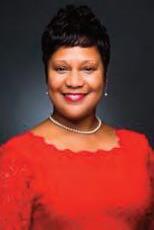
Next highest score - Blue Band Eb Clarinet or White Band Clarinet - depending on the selection of the higher scoring student;
Next highest score - White Band Bb clarinet;
Next highest score - Blue Band Bb clarinet;
Next highest score - Blue Band Bb clarinet.
*Bb clarinets will be assigned to chairs by means of tryouts again with the clarinets.
*Other unassigned personnel will be placed by the President as needed for the music being performed.
e. No director, for any reason, will judge his own student by himself. The tryout sheet must be signed by another director other than that of the student.
(NOTE: MIDDLE SCHOOL BAND PICCOLO & Eb SOP. CLARINET AUDITIONS ARE HELD AT THE ALL-STATE BAND FESTIVAL.)
d. The placement of Unassigned Personnel in the High School All-State Bands will be as follows: Students with the highest scores in each section assigned to the Red Band; those with the next highest scores assigned to the White Band; those with the next highest scores assigned to the Blue band. The following special assignments will be made for piccolo and Eb soprano clarinet. All other unassigned instruments are assigned “as needed”:
Piccolo: At the All-State tryouts
Highest score - Red Band piccolo;
Next highest score - White Band piccolo or Red Band flute;
Next highest score - White or Blue Band piccolo or Red or White Band flutedepending on the selection of the higher scoring student;
Next highest score - Blue Band piccolo or Red or White Band flute- depending on the selection of the higher scoring student;
Next highest score - Blue Band piccolo or White Band flute - depending on the selection of the higher scoring student;
Next highest score - White Band flute; Next highest score - Blue Band flute;
Next highest score - Blue Band flute.
*All flutes will be assigned to chairs by way of tryouts again with the flutes.
Eb Clarinet: At the All-State tryouts
Highest score - Red Band Eb clarinet;
Next highest score - White Band Eb clarinet or Red Band Bb clarinet;
Next highest score - White or Blue Band Eb clarinet or Red or White Band Bb clarinet - depending on the selection of the higher scoring student;
Next highest score - Blue Band Eb clarinet or Red or White Band Bb clarinetdepending on the selection of the higher scoring student;
f. No quota system will be used for the Alabama All-State Jazz Band recorded audition. Standard big band instrumentation will be used in each of the All-State Jazz Bands. Standard big band instrumentation is as follows: five (5) trumpets, four (4) trombones, one (1) bass trombone, two (2) alto saxophones, two (2) tenor saxophones, one (1) baritone saxophone, one (1) piano, one (1) guitar, one (1) bass guitar, one (1) trap set percussionist, and one (1) vibraphone who will also serve as an auxiliary percussionist. Students who perform with the Alabama All-State Jazz Bands must be selected through the audition process.
Rationale
● When the current All-State Band configuration was put in place, the number of stand-alone middle school band programs was substantially less. With the quality and quantity of our middle school band programs increasing, this proposal expands the opportunity for middle school band students to perform at the All-State level at a critically formative time in their development as young musicians.
● Under the current configuration, the odds of any given high school band student auditioning for All-State being selected to All-State is substantially greater than that of any given middle school band student auditioning for All-State being selected to All-State. This proposal closes that gap.

● This proposal eliminates the necessity of the district-teamed unassigned auditions for middle school unassigned instruments and high school string bass. Under this format, all students can now audition in their home district eliminating substantial travel for some students/parents, which can serve as a barrier to the accessibility of the All-State auditions.
● The “even split” configuration with the Middle School All-State Bands ensures that both bands will have some of the top-scoring players in each section, which will help ensure the quality of both bands.
● In order to accommodate a fifth band on the day of the concert, the author of this legislation suggests setting up three bands on the arena floor the night before or the morning of the concert, holding the Middle School All-State Bands concert in the late morning (approx. 11:00AM), and then holding the High School All-State Bands concert in the afternoon (approx. 1:30PM).

I hope you all have had a wonderful summer and have enjoyed some time to rest and prepare for this year. I enjoyed seeing many of you in July at the ACDA Summer Conference in Tuscaloosa. I especially enjoyed connecting again with this past year’s All-State Middle School Mixed choir clinician, Tesfa Wondemagegnehu, and hearing everything he had to share with us. I left the conference refreshed and ready to jump head-first into the school year. If you have never attended this conference, I encourage you to do so in the future. It always gets me back in “school mode” and excited to start back. Thank you to the Alabama ACDA leadership for organizing and providing great sessions and social events.
If you have not already done so, please renew your NAfME membership. In order to log onto the website to register for AVA events, your membership must be current.
In addition to having a current NAfME membership, the AVA also requires annual sign-up on the AVA mailing list in order to receive communications. All directors must complete this even if there have been no changes since the previous school year. The link to sign up for the mailing list is on the AVA website at www.myamea.org/ava. Please make sure to complete this as soon as possible to ensure you don’t miss any important information.
The AVA had another productive meeting this summer to plan for this year. I will be talking in more detail at Fall Workshop about some of the decisions that were made, but here are a few highlights:
● We will continue with our usual in-person auditions for this year’s All-State auditions. No changes will be made at this time, though we are still considering moving to recorded auditions in the future.
● The All-State Festival registration fee was increased to $35 to account for increased costs due to moving our festival to the Birmingham-Jefferson Convention Complex.
● The All-State Show Choir Festival will be held during the AMEA Conference this year and will not perform during the AllState Choral Festival. As decided by the membership at our All-State General Membership Meeting, ASSC students are no longer required to audition for the All-State Choral Festival.
● The SCPA Adjudication Rubric was reevaluated and the point spread for each rating was adjusted slightly. The new point range for a superior rating is 74-88.
● The SPCA Adjudication Form was changed to include the Auxiliary Information Form. Each director will now complete the auxiliary form as part of the adjudication form in order to provide the adjudicators with background information about the choirs.
● The Sight-Reading Rubric was changed in order to include a dotted-quarter note at the Advanced Middle School/ Intermediate High School levels.

Please visit the AVA website to find the dates for all events for the year. Be aware now of all registration deadlines and plan ahead to avoid paying any late fees.
Our next event will be Fall Workshop at Huntingdon College on Friday, September 6. I am so excited that this past year’s High School All-State Choir clinician, Derrick Fox from the University of Nebraska-Omaha, will be joining us. We will also have AllState music information sessions, mini break-out sessions, and our General Membership Meeting. Registration is now open on the AVA website. I hope to see you all there!
Thank you for taking the time to read about our organization. I would like to encourage you not only to read but to also “jump in” and serve where you are able. We all bring different areas of strength to this organization and are all needed in order to best function. As I begin my final year as AVA President and sixth year on the board, I can truly say that serving our organization is worthwhile, rewarding, and fun. Thank you to everyone who has helped out, even in ways that may seem insignificant. I can assure you that no task is too small or not appreciated.
Please let me know if I can be of service to you in any way or if you have any questions or suggestions about our organization. You may email me at meg.jones.ava@gmail.com
I wish you all the best for the starts of your school year and I look forward to seeing you all at Fall Workshop!
Sincerely,
Meg Jones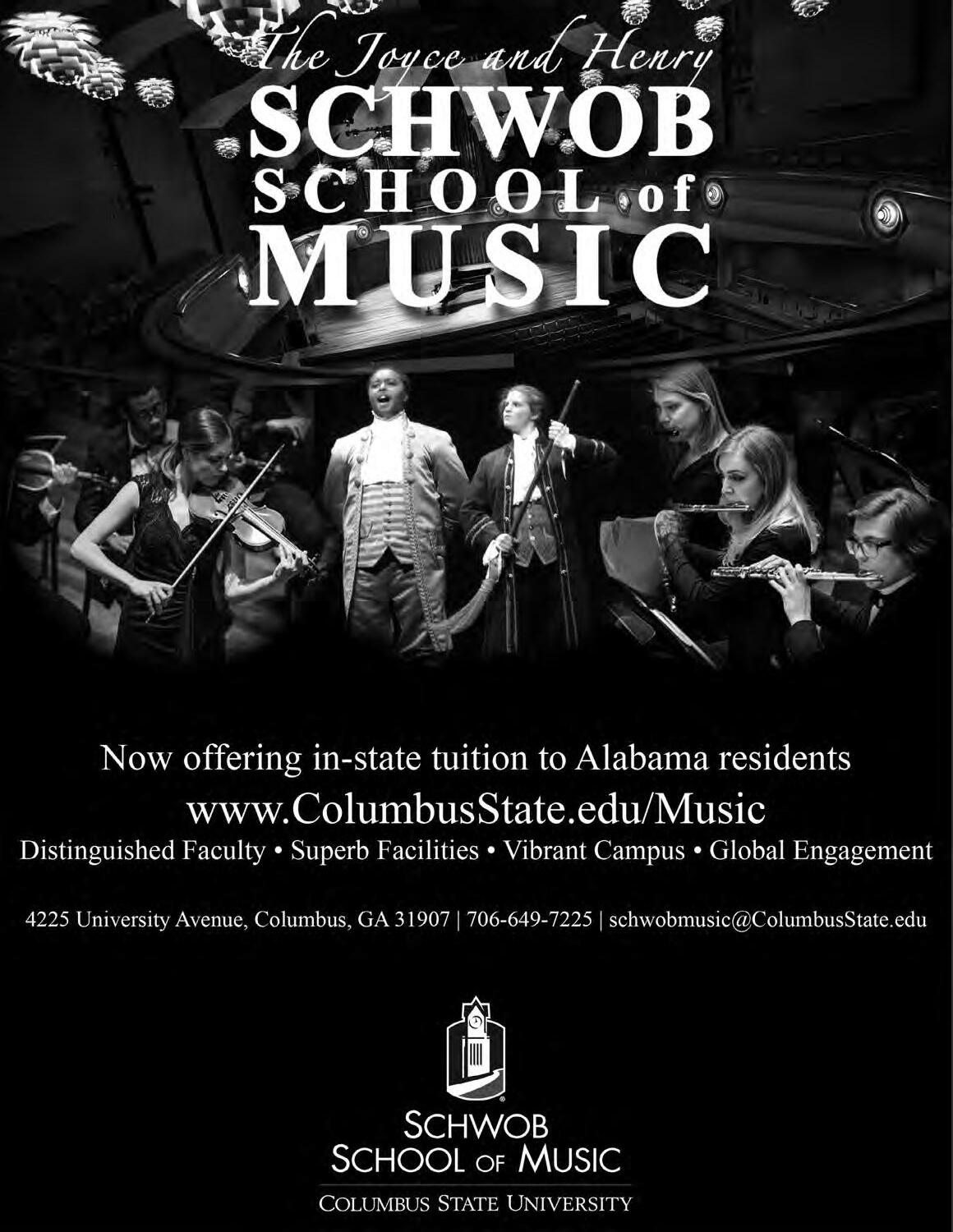
Hello, colleagues across the state of Alabama. I hope that the summer has provided you time to rest, reflect, enjoy time with family, and achieve all the goals you set for this short time away from school. I am excited to welcome Ben Posey as our Jazz Division Vice-Chair for the next two years. Mr. Posey is a band director at Bumpus Middle School, in Hoover, and is active in jazz education as a teacher. His jazz program at Bumpus continues to grow and many of his students have earned positions in the All-State Jazz Bands.
All-State Jazz Band auditions are some of the earliest auditions on our calendar, and we hope to make the All-State Jazz Band an event that your students look forward to each year. Registration instructions, audition instructions, and audition materials are available online at myamea.org/aba. Registration and audition recording submissions are all done electronically. Students are required to perform scales, etude, and play-along tunes, all submitted electronically via a link. The deadline for registration and payment is October 30, 2019. The deadline for submitting student recordings is November 13, 2019.
Pat Stegall - AMEA Registrar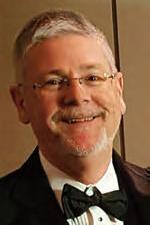

on January 16-18, 2020 at the Renaissance Montgomery. We have a stellar panel of clinicians to work with your students this year, including:


Jim Ketch - Gold Band, The University of North Carolina at Chapel Hill
Tom Luer - Silver Band, Freelance Saxophonist, Los Angeles, CA
Sallie Vines White - Bronze Band Hoover High School, Hoover, Alabama
Art Ruangtip - Middle School Band Rowlett High School, Rowlett, Texas
I hope that you have a successful start to your new school year and achieve the goals you set for yourself and your program. I also hope to see many of your students involved in the All-State Jazz Band audition and festival process. Please feel free to contact me with any questions you have along the way.
It is not too early to be thinking about our AMEA Conference in January, 2020. Just remember, you must join NAfME, and you should pre-register if possible. A healthy organization is always concerned with growth and development, and the AMEA board is interested in growing our organization, and for getting all music teachers in Alabama involved in professional development through AMEA and NAfME. You can help increase our membership by communicating the benefits of membership to our colleagues. When you are joining or renewing your membership, think of those music teachers in your area that may not be active members, and send them a message inviting them to join! You could send an email with their contact information to me at pstegall@mscs.k12.al and I will invite them!
Remember to: Remind your colleagues to join, include the new music teachers, invite the inactive music teachers and be involved as a
mentor to the young music teachers.
Renew your membership now at www.nafme.org . Membership in NAfME is required for participation in state MEA sponsored events like the AMEA Conference, the Elementary Division Fall Conference, All-state and Musical Performance Assessments. Joining NAfME secures your membership in AMEA and in your division. The national office has recently gone through an upgrade to the system, so I would recommend that you get your information updated ASAP.
Register now for the 2020 AMEA conference online at www.myamea.org. You will find it is easy and will save you time and money. Reunite with friends and colleagues from all over the state in January. Rejuvenate your energy and renew your enthusiasm for the rest of the school year!
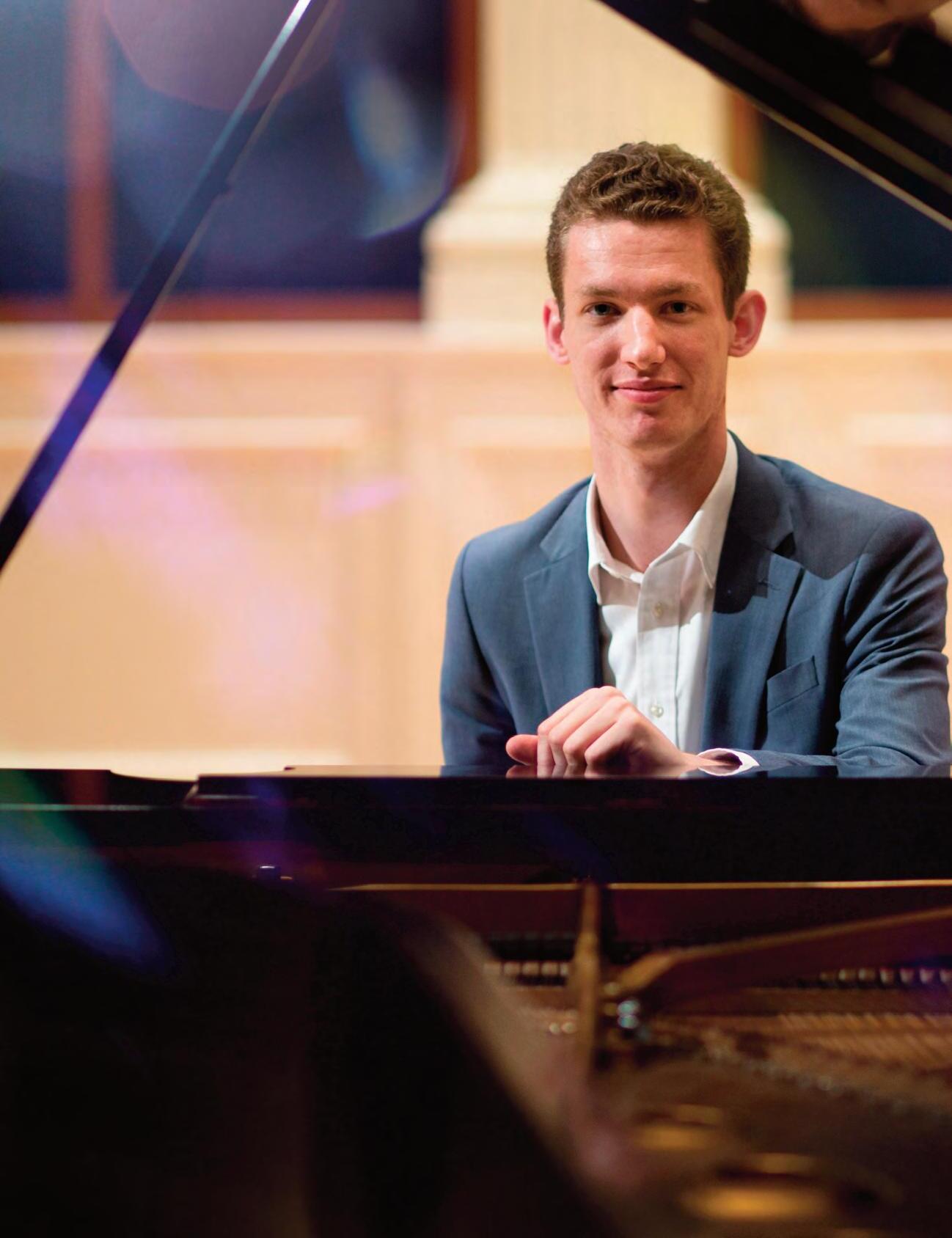



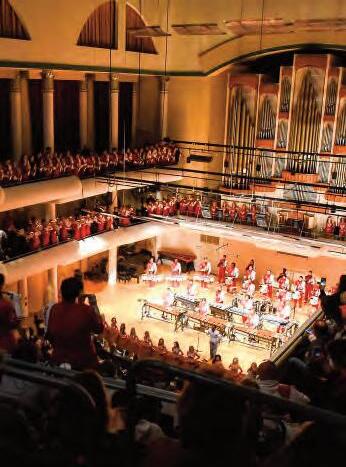

Middle School Honor Band Festival
December 12-13, 2019
Registration Opens Online
September 3, 2019 bands.ua.edu/programs/mshb
High School Honor Band Festival
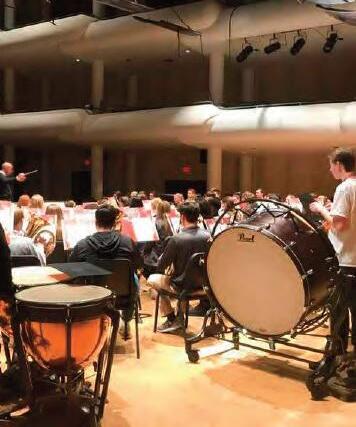
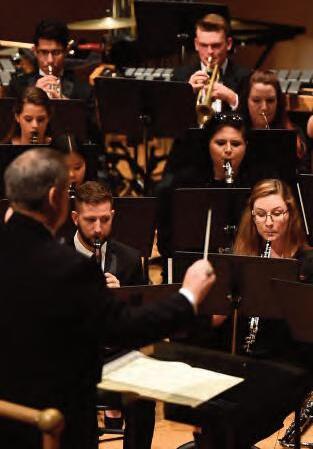
January 30 - February 2, 2020
Registration Opens Online
September 3, 2019 bands.ua.edu/programs/hshb
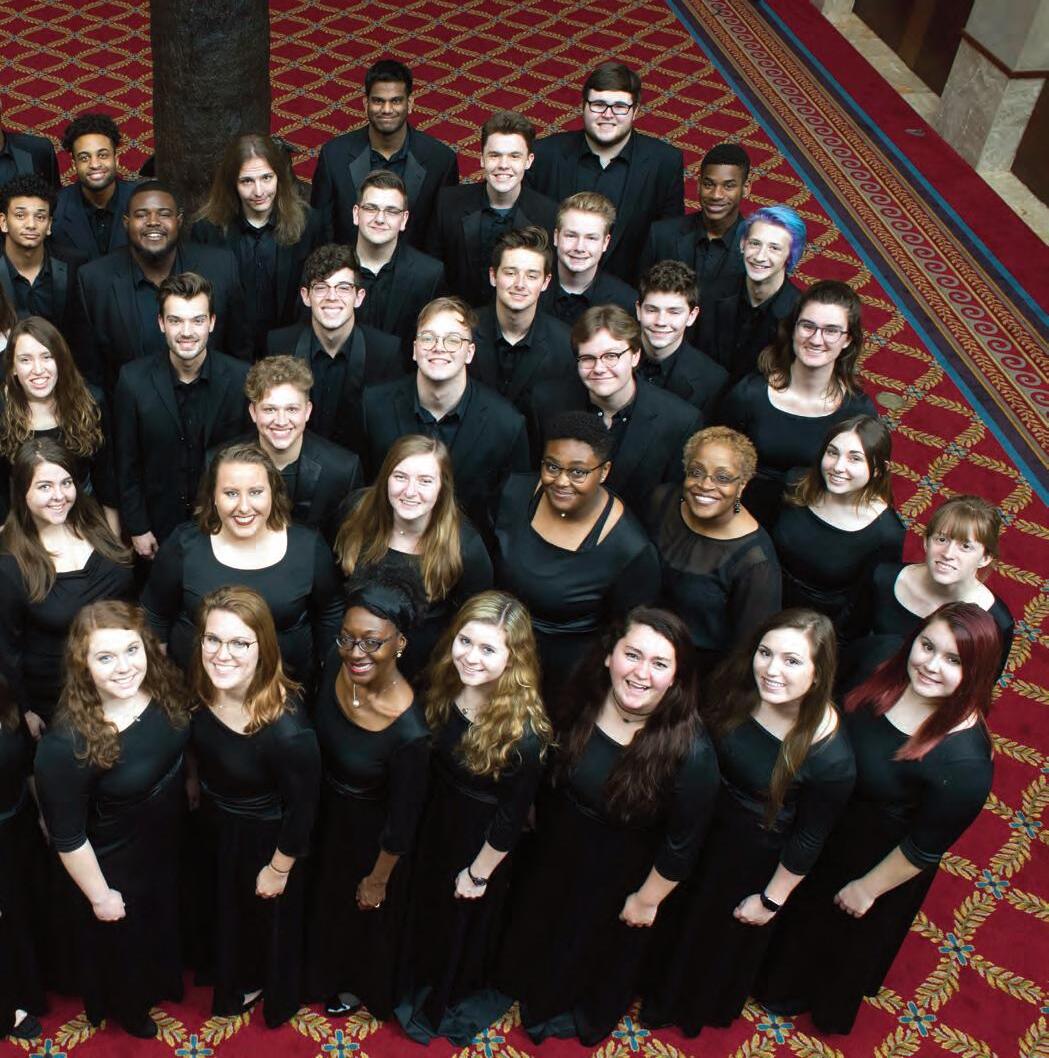
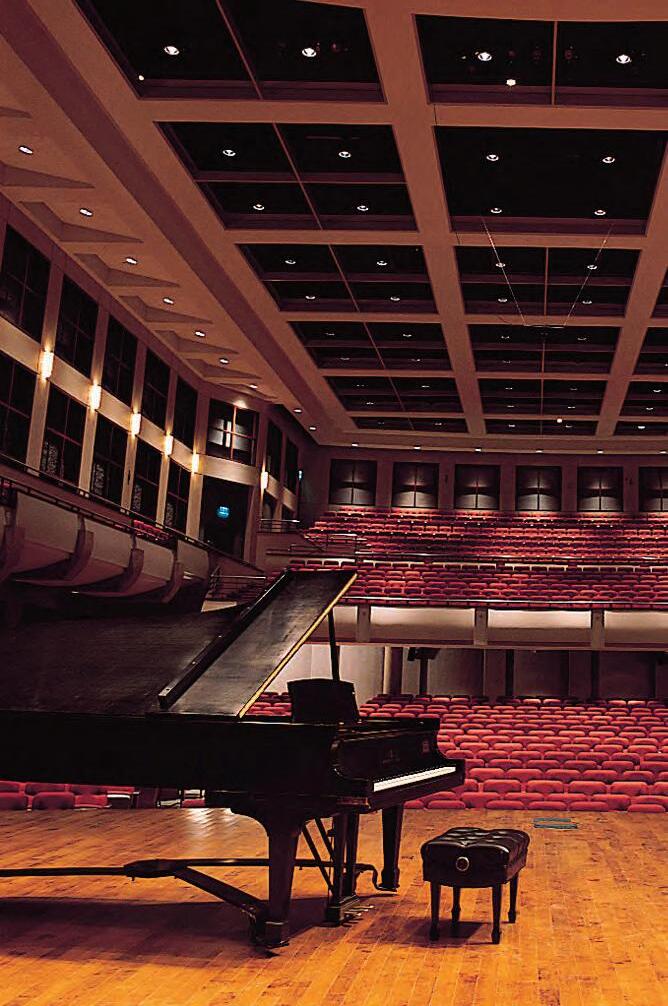
MUSIC THAT WILL CHANGE YOUR WORLD
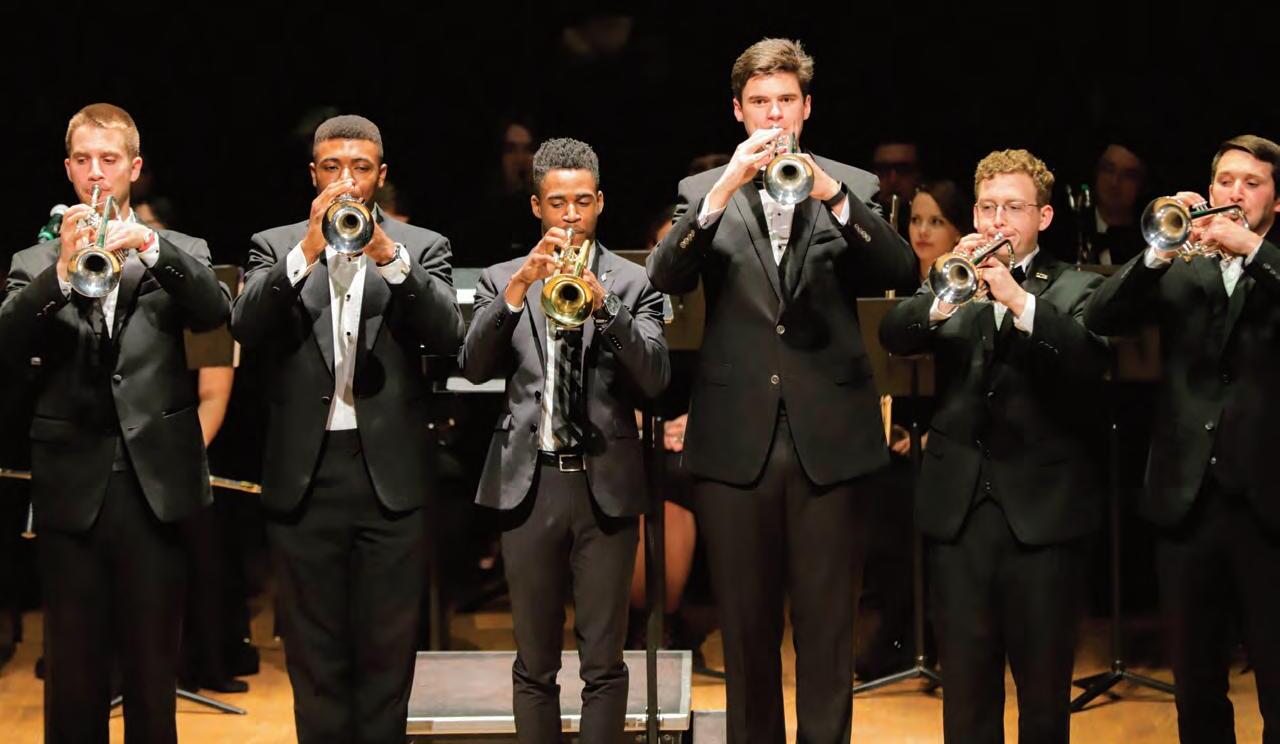

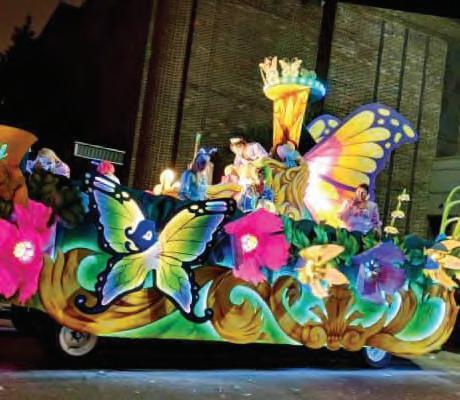
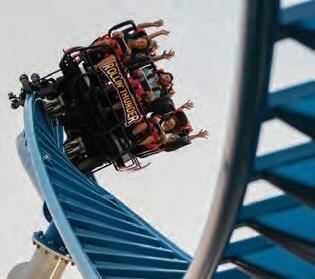
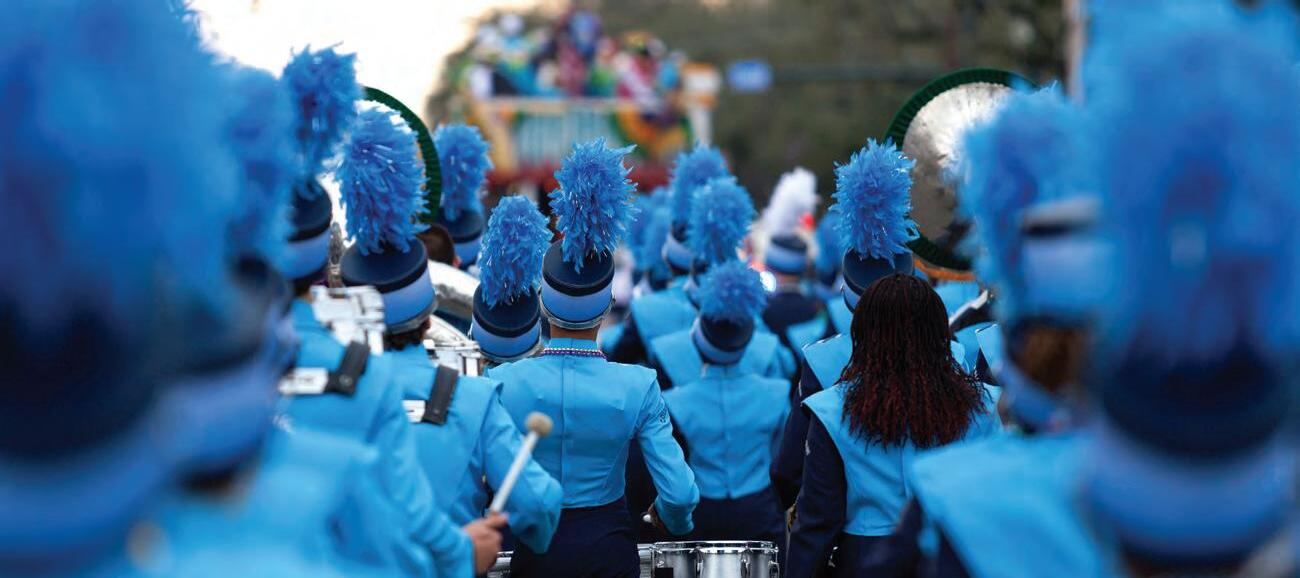
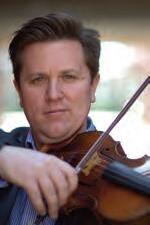
Welcome back to what I hope will be another great year! I know all of you have been working hard throughout the summer preparing for the new school year. Please know the work you do for our students does not go unnoticed! As such, the Alabama Orchestra Association is looking forward to serving you and your students throughout the 2019-2020 school year.
As we begin this school year, I would love to hear from those of you currently teaching in a school-based or community-based string and/or orchestra program here in Alabama. We want to feature you and your programs via our social media pages and other available outlets. Please let me know what you’re up to and any events you may want to promote and we will share that with our membership.
The fall is an especially busy time for the AOA. The beginning of August will see excerpts posted for the upcoming Orchestra All-State Festival auditions. We have made several updates to our audition procedures for next year’s festival. We will be combining the audition material for the Festival and Sinfonia orchestras and including scales and etudes for the first time. We will also be adding a second audition day in early-November specifically for Wind, Brass, and Percussion students ONLY to help alleviate the issues of preparing and auditioning during marching season. More information about these changes as well as district audition dates, times and locations can be found on our website – www.alabamaorchestra association.org. As in previous years, students can take advantage of being able to audition in any district so as to allow for scheduling conflicts. If you are a band director, we sincerely hope that you will encourage your students to audition for our All-State Festival. As you know, the experience of performing with strings as well as the challenge of playing one to a part is something a lot of our band students never get the chance to do.
I am excited to announce that we have a wonderful line up of conductors for our 2019 Orchestra All-State Festival which will be held from Feb 6-9, 2020 at the University of Alabama. Our Festival Orchestra will be under the leadership of Mr. Thomas Heuser (Idaho Falls Symphony and San Juan (CO) Symphony), with Mr. Creston Herron from Klein HS (TX) conducting our Sinfonia Orchestra, and Dr. Rebecca MacLeod (UNC-Greensboro) conducting our Consort String ensemble. More information about our conductors and festival repertoire can be found on our website.
The Alabama Orchestra Association always strives to find quality clinicians for the AMEA Professional Development Conference. We look for clinicians who will inform, educate, and inspire not only our state’s string teachers but music educators across all the divisions. The 2020 AMEA Conference (Jan. 17-19) will be no exception with a lineup of distinguished clinicians headlined by Richard Meyer. Mr. Meyer is a highly sought-after music educator as well as being a nationally-recognized, best-selling composer with over 190
compositions and arrangements in print. For 16 years, Mr. Meyer served as string editor for Alfred Publishing Company and is the coauthor of several string method books, including the popular String Explorer Series and Sight-read It for Strings. He maintains and active schedule as a guest conductor and clinician and we are delighted that he will be joining us!
We will also continue to encourage string vendors to attend the 2020 AMEA conference. As we are able to lock in those vendors, we will let you know who they are via our Facebook page so you can contact them with any specific needs you might have while you are attending the conference.
During the 2019-2020 school year we will continue to build upon the success of our annual Orchestra Music Performance Assessment event. We expect to have details regarding locations and dates (in Spring 2020) finalized soon. As always, check our Facebook page and/or the AOA website for updates. We encourage all string teachers including those that teach guitar and non-traditional string ensembles from both school-based and community-based programs to plan on participating.
Lastly, the AOA is here to serve you. If we can be of any assistance to you or your program please reach out to us. We hope you have a successful and rewarding school year and look forward to seeing you at one of our upcoming events.
Important Dates for 2019-2020
All-State Audition Materials Released - August 2, 2019
All-State Audition Application Deadline - September 27, 2019
String Auditions (as well as early wind, brass, & percussion)
Early-October (check website)
Wind, Brass, & Percussion ONLY Auditions
Early-November (check website)
String Audition Results Posted - November 18, 2019
Wind, Brass, & Percussion Results Posted November 25, 2019
All-State Scholarship Application Deadline - December 6, 2020
AMEA Conference - January 16-18, 2020
All-State Orchestra Festival - February 6-9, 2020

Orchestra Music Performance Assessment
Spring 2020 (check website)
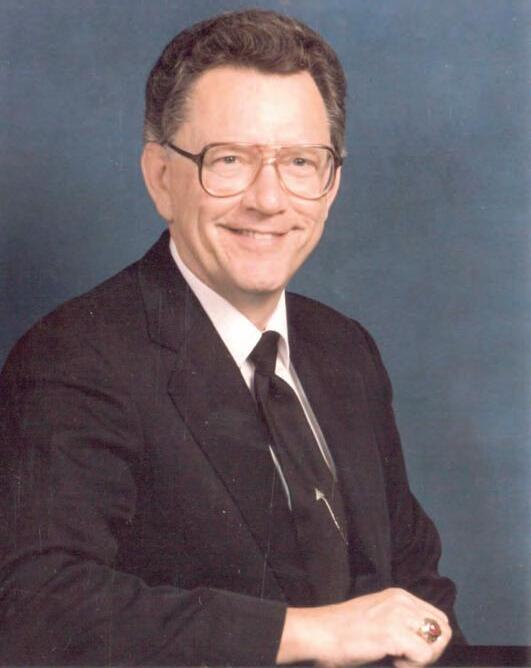
Fayette Band elected to play some of the most challenging music of any band in the state. Through the years, they impressed judging panels with such “warhorses” as “March Slave,” “Light Cavalry Overture,” “Finale from Symphony #4” (Tschaikovsky), “Morning Noon and Night in Vienna,” “The Universal Judgement,” “The Barber of Seville,” “La Forza Del Destino,” “Rienzi,” “The Marriage of Figaro,” and “The Poet and the Peasant.”
What made the band program at Fayette so good for so long?
A Fayette rehearsal always started on time. Regardless of the demands for his attention, nothing stopped Jerry Bobo from stepping on the podium at precisely the right moment. He was ready and insisted everyone else was as well.
Hearing the Fayette County High School Band at State Competition was an experience hard to forget. Fayette is not a large town. But you’d never know it from watching that band take the stage. Often, the stage was barely large enough to hold everyone.
Who could forget the iconic smile on the face of its leader, Jerry Bobo? Was that smile a sign of confidence that he knew the band was wellprepared? Or maybe it signified the love he had for every young person as they filed onto that stage. Maybe it was some of both.
Jerry Bobo was a product of Fayette. After graduating from Fayette County High, he attended the University of Alabama. His goal? To be a band director. That goal was realized sooner than expected. In 1956, two years into his collegiate career, the job at Fayette came open. Jerry Bobo was hired. It would be the only band job he would ever hold.
The Fayette program numbered 54 at that time. For the next two years, Mr. Bobo drove back and forth from Fayette to Tuscaloosa to finish his degree. Over the years, the program grew to well over 400 students. For most of his 35 years on the podium, Jerry Bobo taught the entire program by himself. During his tenure, the Fayette County High School Band earned a “Superior” rating at State Competition a remarkable 31 times.
The school enrollment placed the band in “Class B.” However, the
Though the groups were large, discipline was never a problem. April Renfroe Tolbert, a stellar clarinetist who became an outstanding band director herself, adopted many of the techniques she learned from her teacher. She related that Mr. Bobo kept you so busy, you had no time for mischief. In the early grades, if he asked the trumpets to play “line 10,” everyone else in the band had their instruments to their faces fingering line 10 as well.
The Fayette program was large, but nobody could hide. Jerry Bobo called on students at random to play their parts in front of everyone. It was a practice that started in 6th grade beginning band and continued through high school. He would also play the “chair game” without warning. If he picked your section, you could gain or lose several chairs by how well you played your assignment.
The message was clear: Everyone was important. Everyone had a responsibility. Everyone was capable. Mr. Bobo had a collection of sayings. James Hall, who worked with Mr. Bobo during the last 10 years of his career, recounted one of his favorites: “Every tub needs to sit on its own bottom.”
Another Jerry Bobo saying was, “Practicing is like putting money in the bank.” Leaving your instrument in the band room overnight was unheard-of. If you did leave your instrument, you wouldn’t find it the next day in the spot you left it. You had to go and ask Mr. Bobo for it. It’s something that seldom happened with a student more than once.
Living up to the expectations of the “leader of the band” had nothing to do with fear. It had everything to do with not wanting to disappoint
Mr. Bobo. This theme was echoed by one former student after another. His care about the band program and every student in it gave every member something to live up to.
Expectations were high. However, Mr. Bobo stressed that the expectations in the band room were no different than expectations in the workplace. “This is a dress rehearsal for life,” he would say.
Consistency was a hallmark of the band program under Jerry Bobo. When you arrived in the morning, Mr. Bobo greeted you at the band room door, calling you by name. The same happened in the afternoon as you left with instrument in hand.
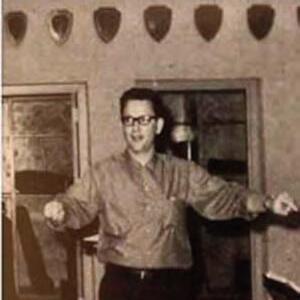
The high school band rehearsed every Thursday evening…no more, no less. Employers in town came to know that if you had a Fayette band member on the payroll, they needed to be off on Thursday evenings. Thursday evenings was band practice night for you, just as it had been for your parents when they were in the Fayette Band.
When helping an incoming 6th grader to select an instrument, Mr. Bobo would stress, “This is going to be a 7-year journey.” According to James Hall, Mr. Bobo’s mantra was: “Don’t quit.” Throughout that journey, he would talk to the students about the tradition of Fayette County High School Band. They knew they were part of something special. They also knew they had the responsibility of continuing that tradition. There’s something to be said for changing with the times. There’s also something to be said for figuring out what works in your community and sticking with it. Mr. Bobo used the same beginning band method book throughout his career. When the band got new uniforms, the new ones were identical in style and color to the ones that had gone before them. The style of halftime show remained unchanged throughout the years. Those traditions gave Fayette a certain uniqueness. It also united generations of band students who shared in those traditions.
Playing an instrument well was the heart and soul of the program. When the marching band took the field, there were no flags or dance lines. The band consisted of playing members and majorettes. Every majorette also played an instrument. In fact, one of the requirements to be a Fayette majorette was you had to try out for All-State. There was no drum major. Four short whistles from the head majorette kicked off the show.
During his time at Fayette County High School, Jerry Bobo was elected President of the Alabama Bandmasters Association, Alabama Music Educators Association, and Rho Chapter of Phi Beta Mu (Alabama chapter of the national band fraternity). He was also inducted into the Phi Beta Mu Hall of Fame. Locally, he was named “Fayette Man of the Year,” “Fayette County High School Teacher of the Year,” and President of the Fayette County Teachers Association.
After his retirement, Jerry Bobo was elected mayor of Fayette. He remained an avid supporter of the Fayette program. Often, he volunteered to carry on rehearsals in the absence of the director.
If you drive by Fayette County High School today, you’ll pass the “Jerry Bobo Music Building,” named for him following his retirement. And as you drive through town, you just might be driving on “Jerry Bobo Drive.” Today, the “Jerry Bobo Scholarship” ensures that good things keep happening for this program and that the legend of this master teacher lives on for generations to come.
On his 82nd birthday, more than 300 former students turned out for a surprise birthday party. This story wouldn’t be complete without including some of his sayings, well-remembered by former students. You’ve read a couple already. Here are some others, each accompanied by that iconic Jerry Bobo smile:
That’s slower than cream rising on buttermilk.
That sounds like a dying calf in a hailstorm!
Can’t never could do nothing.
Stop sitting there like a bump on a pickle.
Don’t give me that flappy dap and ropey dope (Directed to the drummers).
Y’all are as lost as a ball in high weeds!
You don’t know if you are washing or hanging out.
You look like grandma with her teeth out chomping on a biscuit (Directed to clarinetists with incorrect embouchures).
They wouldn’t know the beat if it came up and kicked them in the knee.
Your fingers are as slow as molasses on a cold morning. Cho-co-late, choc-co-late, choc-co-late pie (to teach a rhythmic figure).
If you can play a piece perfectly (with no mistakes) five times in a row, it is ready to perform!
We don’t do things bush league.
The hay is in the barn.
But there’s one more. It’s a belief that kept him excited about band for 35 years. April Renfroe Tolbert talked about the many times Mr. Bobo said, “If there’s anything in this world better than young people, I’ve never seen it.”
Jerry Bobo died on June 9, 2019, at the age of 83.
Some students do not play instruments as well as they might because they seem to lack a clear idea what that weapon in their hands is supposed to sound like. In clinic settings, or when guest conducting, I often ask students what they would do if they wanted to become a great basketball player. Their answers tend to be, “I would practice and watch great players like Stephen Curry or Lebron James.”
So now that we’ve discovered many have a “basketball hero” I inquire, “So what is your plan to become a great trumpet, oboe, or clarinet player?” Incredibly they often sit there with few ideas at all.
My favorite Jerry Sternin quote says, “It’s easier to act your way into a new way of thinking than to think your way into a new way of acting.” Sharing that idea with students just stops the room in its tracks, but rather quickly the lights seem to come on. Take just a moment to ponder that thought-provoking statement for yourself and see what you make if it. Much depth in those 23 little words.
So, do you want to be a great clarinet player? Well if you sit there thinking, “I want to be a great clarinet player!, I want to be a great clarinet player!, I want to be a great clarinet player!” while you pound your forehead with your fist, you’re probably still a rather weak clarinet player - and now your head hurts. But if you observe a great clarinet player, and start to act like that person, rather quickly you will get better! Your “actions” (that word contains ‘act’) will soon become good life-long habits.
Everyone needs a “Tone Hero.” A professional player on their instrument whose superb quality of sound is what they want for themselves. And why is tone so important? Well simply – your tone is EVERYTHING! Carlos Santana once stated that if he were playing, and the audience could not recognize him in just three notes, there was something wrong with his TONE. And he’s a guitar player!! How much more important is tone to an instrumental ensemble like a band or orchestra? As much or even more.
On most band adjudication sheets the first two boxes are assessing tone. Now you might counter with, “Hey, wait a minute. That second box is often labeled intonation. What does that have to do with tone?” Well, have you ever tried to tune two or more students with poorly developed tone qualities? I tell students that a tone like a fuzzy bunny and one like a laser beam can’t be tuned to each
Dr. David McCulloughother. When individual student tone qualities improve so does their ability to play in tune with each other. Those individual maturing tone qualities also provide you better opportunities to teach good ensemble intonation. And look at that second-box word a different way. In–TONE–ation. Once again, tone is everything
So how do we help students understand that their tone is their responsibility? As teachers we provide breathing and embouchure technical assistance, but those who insist that their students each select a personal “tone hero” find commitment to individual tone development to be stronger. Those teachers also report that overall ensemble tone and intonation improve better and faster as well. So how do we assist our students in discovering their own “tone hero?”
Like most music teachers I have lots of good recordings. But since there are few ways to legally share recordings with students, I created the list below at the request of a local band director. This short list was meant simply to get recordings into students’ ears via the internet without them spending money. It was never meant to be a list of “who is the best,” or a complete and comprehensive discography. Many of the recordings were chosen in the hope they might have appeal for young instrumentalists. The intent is to entice students into discovering for themselves what incredible performers on their instruments are out there using a technology they find easy to use.
So here we go. I encourage you to tailor the list below for your students. The needs of a Jr. High Band differ greatly from a Collegiate Jazz Ensemble. Revise this list, or create one of your own, considering what YOUR band needs. And then ask your students a simple but vital question, “Who is YOUR tone hero?” Check them out on YouTube!

Flute
Gudrun Hinze – piccolo
James Galway
Jean-Pierre Rampal – jazz flute
Oboe
John De Lancie
Marcel Tabuteau
Ray Still
Alex Klein
Jean-Luc Fillon – Jazz Oboe
English Horn
Christine Pendril
Robert Walters
Pedro Diaz
Clarinet
Julian Bliss
Richard Stoltzman

Eddie Daniels – Jazz Clarinet
Marcelo Maldonado – bass clarinet SeBass – bass clarinet
Michael Lowenstern – bass clarinet
Bassoon
Arthur Weisberg
Paul Hanson – Jazz/Funk Bassoon
Saxophone
Don Sinta – classical saxophone
Chris Vadala (Soprano)
Antonio Hart (Alto)
Tia Fuller (Alto)
Jessie J (Tenor)
Benny Golson (Tenor)
Gary Smulyan (Bari)
Karl Hunter (Bari)
Randy Emerick (Bass)
Leo P (Contrabass)
BRASS
Canadian Brass
Trumpet
Phil Smith
Tine Ting Helson
Friedemann Immer – natural trumpet
Vince DiMartino
James Morrison – crazy fun!
Louis Dowdeswell
Flügelhorn
Hikari Ichihara
Horn
Richard King
Lowell Shaw
Trombone
Christian Lindberg
Christopher Bill
Euphonium
Childs Brothers (Nicholas and Robert) & Father David Childs –all Euphonium players!
Steven Mead
Brian Bowman
Rich Matteson - Jazz Euphonium
Tuba
Arnold Jacobs
Sam Pilafian
Pat Sheridan
Percussion
Gary Burton – vibes
She-e Wu – marimba
Evelyn Glennie – marimba
Jeff Queen – snare
Final thoughts. I am certain I have left many favorites off this list. As I said in the beginning, this was never intended to be a “who’s the best” list, or a comprehensive discography / videography of what’s out there. The concept of asking your students to improve their own tone qualities was the only intent and the list is simply meant to give students a starting place if they do not know where to begin. I hope your students will come ask you for your ideas. And after they get started feel free to ask them, “So who is your Tone Hero?”
David McCullough is the Director of Bands at Union College in Barbourville, Kentucky. He has taught music in the public schools and at the university level for 40 years. He feels blessed for the new friends and colleagues he has here in Kentucky and looks forward to returning Union’s band to a position of distinction in the South/Midwest. David wishes to thank Monica Crowder, the exceptional director of central Kentucky’s Barren County Middle School Band for the idea of creating and sharing this list. Her band students have all had “Tone Heroes” for 15 years!
Rho Chapter of Phi Beta Mu International Bandmasters Fraternity is committed to the improvement of bands and band instruction in this state. Comments on this column and ideas for future columns are welcome! Please email: pemin@mac.com
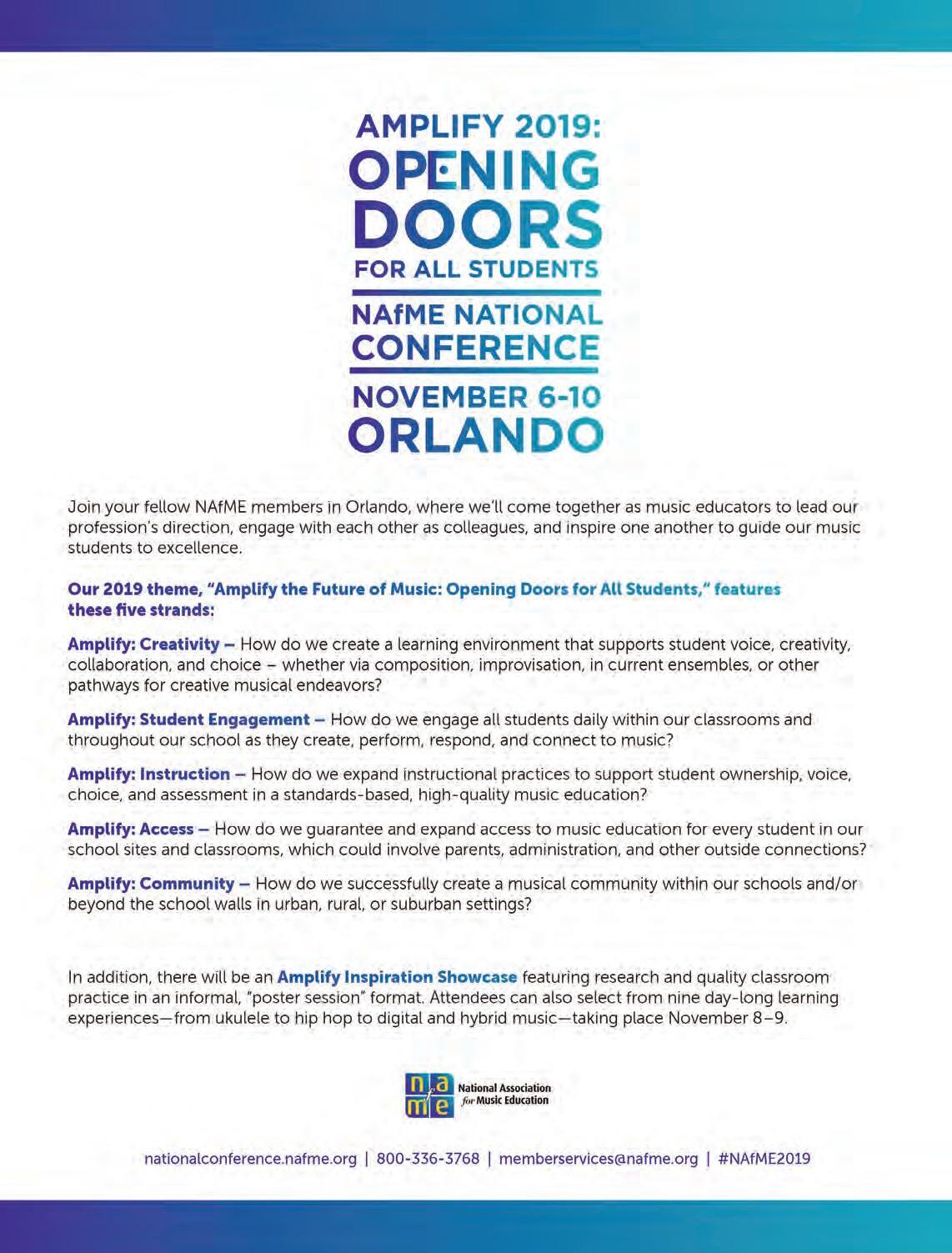
8. “Motion is lotion.” Physical therapists say that movement helps the joints of the body function better.1 Couch potatoes may deny it, but exercise improves how we feel and think.2
7. Sleep is cheap. Those who insist that laughter is the best medicine need to crash for a few hours and see what a long nap or good night’s sleep can do for mind and body.3
6. Complaining is draining. Telling others about how things “ought” to be doesn’t get you nearer your goals. A positive outlook affects both you and those around you for the better.4
5. Food sets the mood. A healthful diet can lift your spirits as well as lengthen your life. Five fruits or veggies a day really does make a difference.5
4. Drink water? You oughta. By the time you’re thirsty, you may already be dehydrated. Keep your brain cells firing better by keeping your body hydrated and happy.6
3. Stretch, don’t kvetch! Getting up from your chair can help increase your alertness.
2. Focus is locus. The Star Wars character Qui-Gon Jinn insisted that what you focus on determines your reality.7 Concentrate on things that uplift you, not the dark side!
1. Have an “attitude of gratitude.” You are everything your ancestors wished for. Count your blessings, and realize that many of your problems are minor. Try life in a major key!
Information Sources:
Rene Pelletier, https://www.renepelletierosteo.com/motion-is-lotion#
“Exercisers Achieve Greater Acute Exercise-Induced Mood Enhancement than Nonexercisers,” Science Direct, January 28, 2008, https://www.sciencedirect.com/science/article/pii/S0003999307016978
“Sleep cures 99 percent of humankind’s ills.”—Dr. Archer C. Wilcox, 1977.
If you’re constantly fussing about your situation, you’re protected by the First Amendment, but you may find that changing your tone changes your perspective.
The “5 a Day” campaign is based on advice from the World Health Organization, which recommends eating a minimum of 400 grams of fruit and vegetables a day to lower the risk of health problems such as heart disease, stroke, and some types of cancer (https://www.nhs.uk/live-well/eat-well/why-5-a-day/).
Joe Leech, “7 Science-Based Health Benefits of Drinking Enough Water, Healthline, June 4, 2017, https://www.healthline.com/nutrition/7-health-benefits-of-water
“Always remember: Your focus determines your reality.”—Qui-Gon Jinn, The Phantom Menace [Film]. See a discussion of this perspective at https://www.youtube.com/watch?v=72w_fUJyVw4.
Colleges and universities are encouraged to submit newsworthy material and announcements for publication in Ala Breve
The Department of Music at Alabama State University will welcome two new instructors to campus this fall. Dr. Michael Westmoreland, will be joining the faculty to lead the University Wind Ensemble and Symphonic Band, and will also teach courses in the music education and woodwind areas. Ms. Jessica Williams, will also be joining the faculty to teach applied percussion and percussion methods, and will serve as director of the ASU Percussion Ensemble. The Department of Music is particularly pleased to announce a new alumni event happening this fall, the ASU Alumni Choir, in honor of the recently retired Dr. Joel Jones, to take place during the Labor Day Classic festivities on campus during the weekend of September 5-8. Interested alumni may contact the music office at (334) 2294341 for more information.
Huntingdon College is excited to announce the following appointments and to share this information with our music colleagues and music students across the state.
Dr. Rusty Logan appointed as Director of Bands.

Dr. Logan has most recently served as Instructor of Music at Huntingdon where he taught courses in the Music Department, and assisted with the Huntingdon Scarlett and Grey Band program. Before his time at Huntingdon he served as the Director of Bands at Auburn High School for 24 years. This past year, Dr. Logan was inducted into the Phi Beta Mu Alabama Bandmasters Hall of Fame.
Mr. Aaron Locklear will be joining Huntingdon College as Assistant Director of Bands/ Director of Percussion Studies.
Originally from Prattville, AL, Mr. Locklear obtained his Bachelors of Music Performance, Percussion at Auburn University in 2015. He then attended the Eastman School of Music and was awarded a Master of Music, Percussion and Literature in 2017. He has marched with the Spirit of Atlanta Drum and Bugle Corps, and currently serves on the Percussion Staff for the Cadets
Drum and Bugle Corps.

Mr. Richard Wangler will serve as Visiting Assistant Professor of Music/and Low Brass.

Mr. Wangler completed a Bachelor of Music, Trombone Performance at Samford Universty, and Master of Music, Trombone Performance at Baylor University. He is currently working toward a Doctor of Musical Arts, Bass Trombone Performance at Louisiana State University. Mr Wangler will teach low brass and selected music courses at Huntingdon.
Scarlett and Grey Marching Honor Band – September 7
Contact Mr. Adam Murphy, Assistant Director of Bands
Huntingdon Winds Fall Concert – November 21, 2019
Contact Dr. Rusty Logan, Director of Bands
Huntingdon College Lessons and Carols – November 29, 2019
Contact Dr. Damion Womack, Department of Fine Arts, Chair
Huntingdon College Choir Tour – March 4-8, 2020



Contact Dr. Damion Womack, Department of Fine Arts, Chair
Huntingdon Winds Spring Concert – March 15, 2020
Contact Dr. Rusty Logan, Director of Bands
Huntingdon Symphonic Honor Band April 17-18, 2010
Contact Mr. Adam Murphy, Assistant Director of Bands
Huntingdon Winds and Jazz Concert – April 21, 2020
Contact Dr. Rusty Logan, Director of Bands
Huntingdon Jazz Spring Tour – May 4-5, 2020
Contact Dr. Rusty Logan, Director of Bands
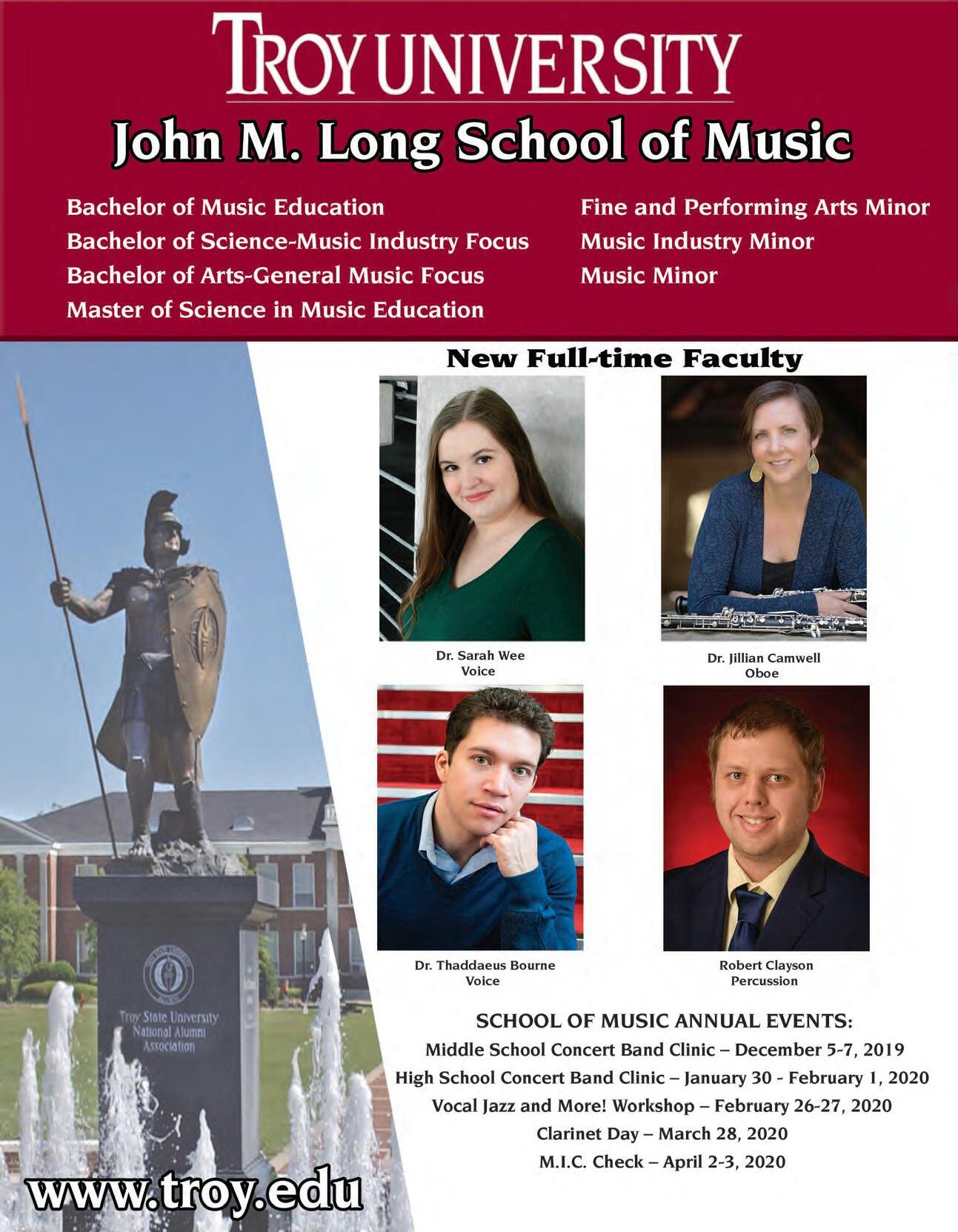
Each Member of the Jaguar Marching Band receives a scholarship
Full-Band travel opportunities to away games and exhibitions
Matching University-provided wind instruments
Fastest growing University in the state and region No fees and No fundraising!
Woodwinds & Brass:

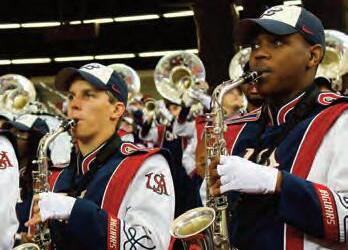
Feb 1 Feb 29 April 11
Jaguar Drumline: March 21 (clinic) April 11 (auditions)
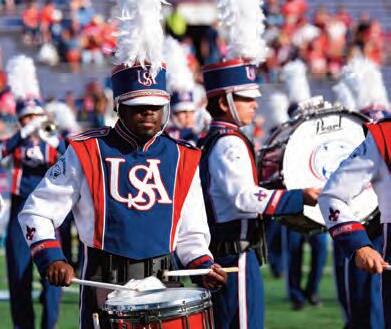
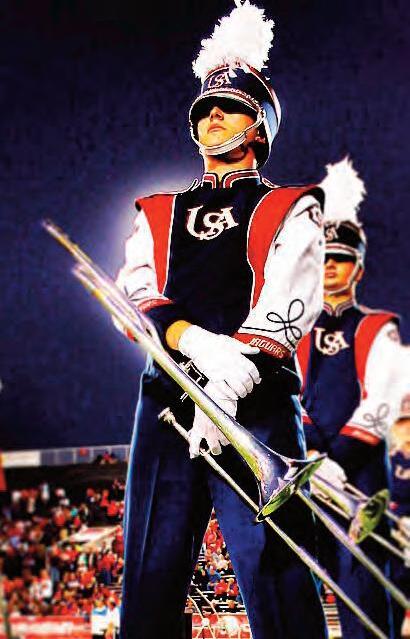
Color Guard: April 18

For more Information about AUDITION DATES visit jaguarmarchingband.org or call 251-460-6136

Laidlaw Performing Arts Center 5751 USA Drive South, Room 1072 Mobile, AL 36688
251-460-6136 • usajmb@southalabama.edu
www.jaguarmarchingband.org facebook.com/jaguarmarchingband

How is it possible that a new school year is upon us? The summers seem to fly by as if we are watching a NASCAR race at Talladega. We thankfully reach the end of May and blink once and it’s the first of August and time to finalize the repertoire planning for your upcoming school year. This summer, I was honored to serve as one of the clinicians at the New England Band Directors Institute, held annually at Plymouth State University in Plymouth, New Hampshire. One of the clinics I was asked to present was to conduct the directors Reading Band as they read some of the new music available for purchase for the upcoming year. It was a fantastic experience to work with these dedicated band directors from all across New England as they prepared for the upcoming school year, familiarizing themselves with the new literature that is available to us from the talented composers working today. All three of the pieces included in my review were read during this conference and I hope you will consider programming any, or all, of these educational pieces during the upcoming year. I have chosen music that I would consider at the grade 2, 3 and 4 level, so there is definitely something for everyone…including a holiday concert suggestion!
Ash and Stone, published by TSG Music Works, is one of the recent additions to our literature by Alabama’s own Tyler S. Grant. Tyler is a recent graduate of the University of Alabama and has just started his teaching career serving as the Director of Bands at Holy Innocents Episcopal School in Atlanta, Georgia. Ash and Stone was commissioned by a consortium of middle school and high school bands from all across the country and is written at the grade 2 level. One of the challenges for young wind band musicians is to be comfortable performing in time signatures other than 4/4. Tyler chose to write this piece in 3/4 time, and it provides a wonderful teaching opportunity for young bands to solidify their performance in triple meter. Utilizing appealing tonalities and a few “special effects”, your young band students are sure to enjoy performing this piece which is a musical depiction of the power and force of what lies beneath the earths’ surface. All voices have an opportunity to contribute to the piece which includes only two clarinet parts, two trumpet parts, one trombone part (with divisi) and plenty of notes to keep your percussionists busy and, more importantly, challenged. Ash and Stone is another wellconstructed piece which shows Tyler’s growth as a composer and music educator. I hope you will consider Ash and Stone for your young bands this coming year. I’m sure both you and your students will enjoy working on this piece.
Programming for your holiday concert can prove to be especially challenging, as the body of music written for the holidays is certainly limited. Composer David Gorham brings us a delightful new holiday concert piece this year with A Celtic Christmas, published by Wingert-Jones Publications. David has been the director of bands at Owasso High School in Oklahoma since 1989 and has one of the most respected programs in the country. Music from Ireland has gained tremendous popularity over the past few years and David utilizes two familiar Celtic tunes for this outstanding work. Using the beautifully melodic “Wexford Carol” and “I Saw Three Ships”, the piece allows us the opportunity to
strengthen our students skills in performing lyrical, flowing lines with the Wexford Carol and to hone our skills at playing in 6/8 meter with I Saw Three Ships. Complete with the characteristic sounds of the bagpipe drones and Celtic drumming, this work is sure to be a big hit with your students and your audience alike. Written at the Grade 3 level, A Celtic Christmas is composed using three clarinet parts, two alto saxophone parts, two trumpet parts and two trombone parts. The percussion writing is strong and offers your percussionists many opportunities for growth. I encourage those of you with more advanced groups to take a look at this piece. The writing for the chorale style opening is exceptional and the piece offers an incredible opportunity for our students to perform in a characteristic “lilting” style with the writing in the final section. A Celtic Christmas would make a delightful addition to your holiday concert.
Another addition to the repertoire from Wingert-Jones Publishing and composer Travis J. Weller is an exciting concert opener titled Triumphant Flourishes. Written at the Grade 4 level, this piece was written to honor a retiring music educator for her service to the profession for over 30 years. In Triumphant Flourishes, Travis uses 6/8 time as the vehicle for presenting an imaginative and attractive set of themes. I have found that teaching the proper style for performing pieces in 6/8 always provides a challenge for most middle school and high school students. Any opportunity I have to work on music that strengthens the students understanding of this concept, I take advantage of that opportunity. Triumphant Flourishes provides just that opportunity and is both joyful and celebratory and would be appropriate for use at any time during the school year. The piece is well-crafted and offers many interesting and colorful melodic and rhythmic counter-lines which will keep your students engaged as they work toward their performance of this fantastic new piece. Travis J. Weller is the director of music education at Messiah College, where is supervises student teachers, works with graduate conducting students, teaches methods courses and conducts the Symphonic Winds. His new Triumphant Flourishes is a welcome addition to our repertoire, and I encourage you to consider this inspiring and educational piece.
As always, I hope the new school year brings you excitement and joy and that you and your students will enjoy the new adventures ahead. Please do not hesitate to contact me if I can be of assistance to you or your program.
Randall Coleman Associate Director of Bands, University of Alabama Conductor and Music Director, Alabama Winds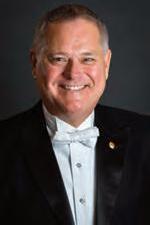
As the summer is coming to close, many of us are busy planning our upcoming academic year. We are a music community and one of my goals this year as the Alabama Jazz Education Network President is to help connect resources within our region. This article will be directed towards an initiative to do just that.
There are great clinics, festivals, concerts, jam sessions, and jazz scholarships within our great state that many are not aware of. The Jazz Education Network is dedicated to building the jazz arts community by advancing education, promoting performance and developing new audiences. The new Alabama JEN Unit Facebook Group Page will serve as a centralized location to receive information about jazz concerts, jazz events, educational workshops, jazz festivals, jazz scholarships, and jazz camps within our region. This is a Facebook group page where everyone will be able to publish his or her own jazz concerts and events. We will also publish jazz tips and articles. You do not need to be a JEN member to contribute or review. The link to this resource is: https://www.facebook. com / groups/AlabamaJEN/.
Regardless of whether or not you are a JEN member, we hope you will take advantage of this resource. There are already events taking shape in our region for this year including: the 2019 GSCC Jazz Festival Celebrating “Women in Jazz” (November 7th), The Troy University Jazz Festival (April 4th), the JSU Jazz Festival (April 10th), and there are several other events to be added at a later date. Stay tuned to our Alabama JEN Facebook page for a calendar and schedule/
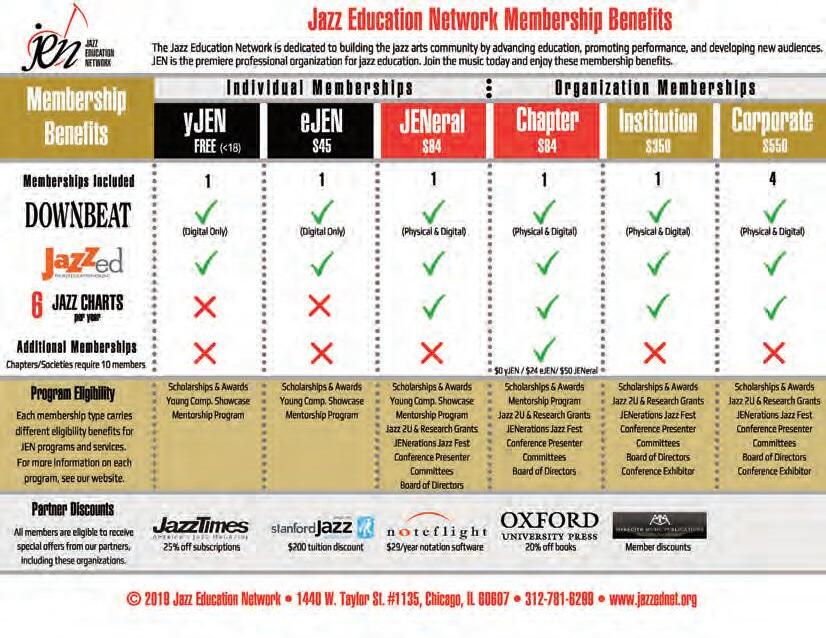
details for published events.
The Jazz Education Network is an organization that we can utilize to bring our local jazz community together. JEN is the premier professional organization for jazz educators and students. Membership in JEN is an enriching experience for everyone involved in all aspects of music, from educators to professional musicians, to students, and industry partners. JEN advocates for the advancement of jazz as an art form and the inclusion of jazz pedagogy in all educational settings and in jazz artistry and business; it promotes jazz performance on a local and global basis; and leads the development of new and expanded jazz audiences worldwide. If you still aren’t convinced, I have included a jazz education network membership benefits comparison chart in this article.
If you are interested in joining JEN, please visit http://jazzednet.org/ join/. Director memberships cost $84 (JENeral Individual Membership) or $45 (eJEN Membership). See the Membership Benefits Comparison
Chart to decide which membership is right for you. To join via phone, call 312-781-6299, option 4 to speak with the JEN Membership Manager, Jesse Nolan or email membership@ jazzednet.org
After joining, some of your membership benefits will include:
Exclusive downloadable jazz charts. Every two months, a new chart is released for a limited download period (2 months). Current selections include:
“JEN-TEN” by Greg Yasinitsky (Big Band)
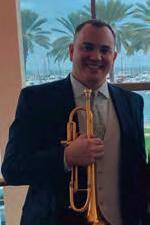

“Take The Next Train” by Horace Alexander Young (Combo)
Apply for a Jazz2U $300/$500 Grant to fund a guest artist, clinician, etc. for your program. Applications are due before October 1.
Request your FREE Traditional Jazz Curriculum Kit
Join the Alabama Jazz Education Network Facebook Group to stay connected to your local jazz education network
Register for the 11th Annual Jazz Education Network Conference in New Orleans, January 710, 2020. Early Bird (Discounted) Registration ends September 30. This is an excellent opportunity to connect to the global jazz community and there is a JENerations Jazz Festival that your groups can perform in (apply to participate). To register for the JEN conference, go to http://jazzednet.org/conference/conferenceregistration/
It gets even better! At the local level here in Alabama, we can start JEN Chapters. Your students will receive exclusive youth membership benefits including scholarship eligibility. Consider chartering a JEN Chapter for your school or organization. A chapter membership costs the same as an individual membership ($84) and includes one (1) “JENeral” Individual Membership for the director and FREE student (under 18) “yJEN” memberships or discounted collegiate “eJEN” membership ($24). Note: chapters have a minimum of 10 student members. Students will have the opportunity to serve in officer positions to
facilitate and promote jazz education/performance at their school.
Student members receive a monthly digital subscription to Downbeat and JazzED Magazines and can also apply for the following JEN programs:
Scholarships & Awards
http://jazzednet.org/advancingeducation/scholarships/.
Young Composers Showcase
http://jazzednet.org/advancing-education/youngcomposer-showcase/
Mentoring Program
http://jazzednet.org/advancingeducation/mentoring/
As Todd Stoll, the current JEN President, has stated, “Let us rise to the level of the art form we support, embody the spirit of the music we serve, and in these particular times, come together”. In closing, regardless of whether you join JEN or not, we need to connect the resources within our region. There are lots of great jazz programs, events, and activities within our region. Please utilize the Alabama Jazz Education Network Facebook Group page to promote your events and to facilitate awareness within our region. Let’s put the word out and “Join The Music”! If you are interested in joining JEN, please reach out to us. There are several other initiatives in the works, so stay tuned to our new Alabama JEN Facebook Group Page. In the spirit of swing, Dr. Matt Leder
JEN Contact Information:
Jesse Nolan, JEN Membership Manager
312-781-6299, option 4
membership@jazzednet.org
Dr. Matt Leder, Alabama JEN Unit President 256-549-8394
matt@mattleder.com
Choral Reviews
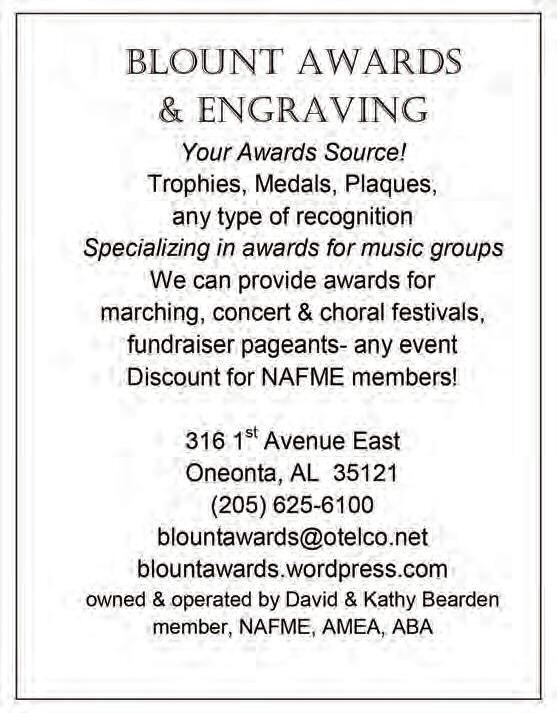
William Powell
Director of Choral ActivitiesAuburn University
Peace Like a River (SSA Women’s Choir and Jazz Trio Accompaniment)
Arr. Skip Stradtman
MusicSpoke
MS50985

Duration: Approximately 4:54
To say that Skip Stradtman is a talented young composerarranger is truly an understatement. One glance at his work is all you need to realize that you have encountered an incredible musician. His arrangement of Peace Like a River for Women’s Choir and Jazz Trio is evidence of my claim. The harmonies are well-voiced and the key changes are seamless. I especially appreciate how Stradtman maintains a rather authentic use of jazz rhythms and harmonies without making it sound hokey. While this arrangement is not for the beginner ensemble, I believe it is still accessible to the average treble choir. The piano accompaniment requires a skillful reader and player, particularly for properly executing the jazz rhythms.
Philip E. Silvey
Carl Fischer
CM9590
Duration: Approximately 3:38
Veteran composer, Philip Silvey, was inspired to write this song after having observed a baby robin make its first attempt at flight. When the robin fell to the ground, Silvey knew that it would eventually have to fend for itself. He likened this event with the seminal moments that we face as humans as we garner the courage to “leap from one stage of life into the next.” Silvey cleverly creates a sense of unrest and anticipation in both the piano accompaniment and the voices, both of which support the text and the underlying message of the song throughout the composition. He maintains a homophonic texture with very declarative rhythms. Silvey evidences his thorough understanding vocal ranges by his ideal voicings for TBB singers.
Ysaye
M. BarnwellBarnwell’s Notes Publishing
YMB103-2
Duration: Approximately 4:33
A former member of female internationally acclaimed vocal group, “Sweet Honey in the Rock” many of Barnwell’s compositions can be heard on the groups’ recordings. As part of a suite of songs, “Wanting Memories” was commissioned for “Crossings” which was a dance theater piece. It also appears on Sweet Honey’s 1993 album “Still on the Journey.” Knowing that it was not originally intended as a choral octavo should inform choirs and directors how to approach this song, considering the full background. Barnwell uses the bass voice as the rhythmic foundation throughout, in vocal ostinato, and she harmonizes the melody (solo) through the remaining voice parts. In classic Sweet-Honey-in-the-Rock style, one can assume that the addition of djembe and/or shekere would be appropriate.
William Powell serves as Professor of Music and Director of Choral Activities at Auburn University. He conducts the Chamber Choir, Men’s Chorus, Concert Choir, and Gospel Choir.
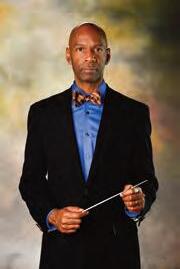
The musical journey never ends. That’s why we brought Master Educators together to inspire teachers and students to realize their full potential. Workshops are designed for middle school through collegiate level and include topics such as: Habits of Successful Middle School Band Directors, Building Leadership In Your Ensemble, Developing a Programming Philosophy and more.
Master Educators include:
Professor of Music in Bands, Indiana University Cross Professor of Music and Music Department Chair, UCLA
Cross Professor of Music and Music Department Chair, UCLA

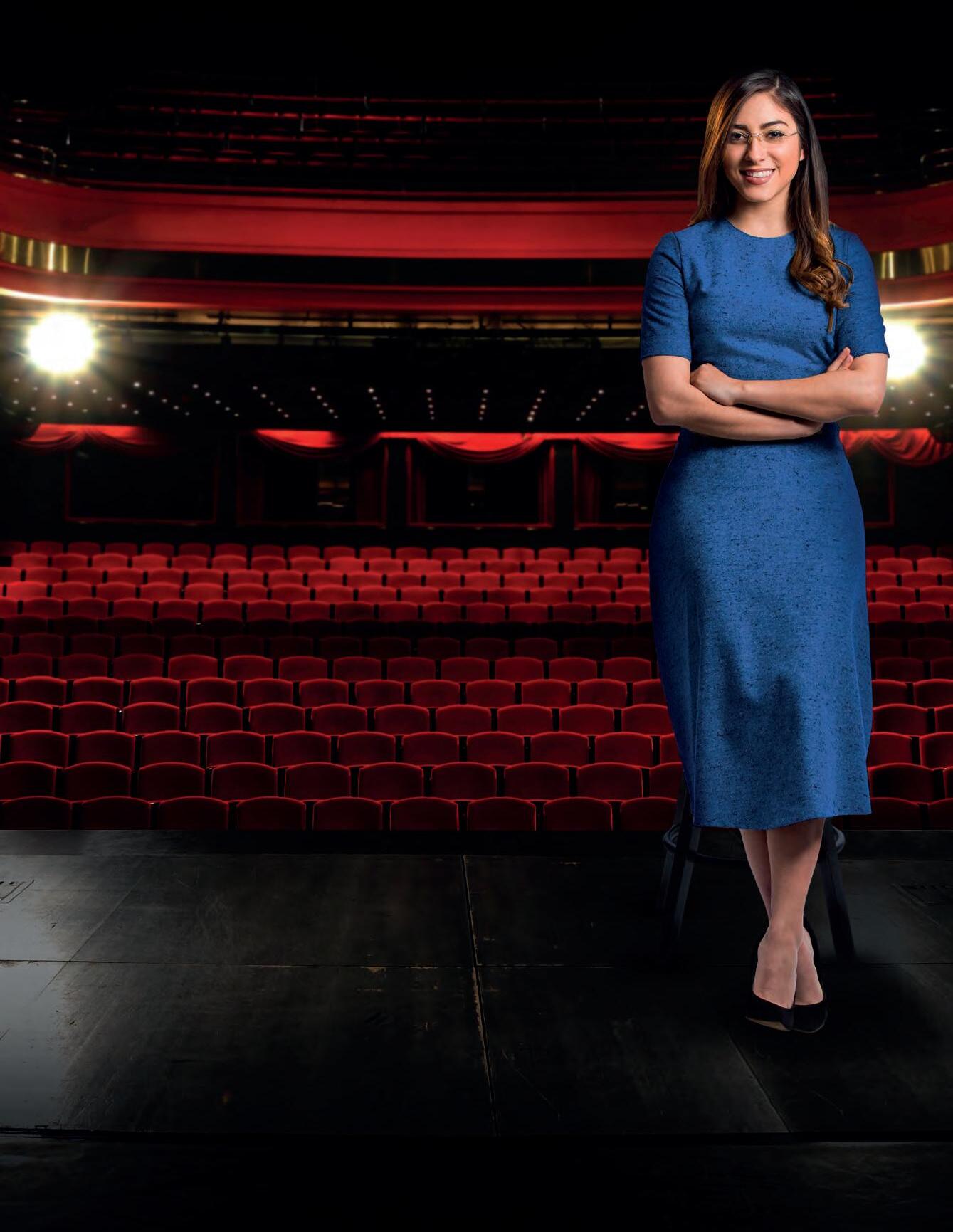 Dr. Emily Threinen Director of Bands and Associate Professor of Music, University of Minnesota
Dr. Emily Threinen Director of Bands and Associate Professor of Music, University of Minnesota
To learn more about the program and choose from 19 specialized Master Educators who will help you reach your goals, please contact Jalissa Gascho at jgascho@yamaha.com. Visit us at YamahaEducatorSuite.com.
 Dr. Rodney Dorsey
Dr. Travis J.
Dr. Rodney Dorsey
Dr. Travis J.
